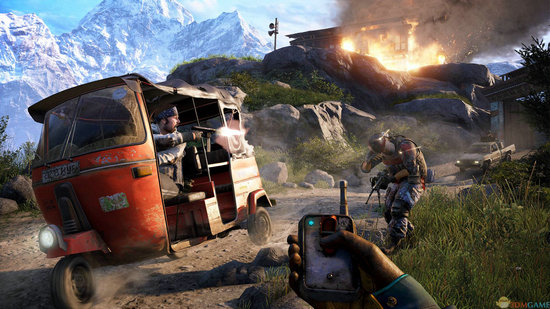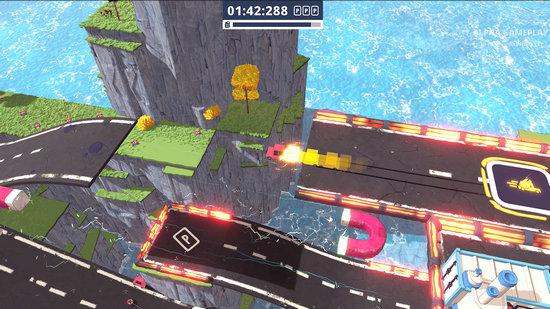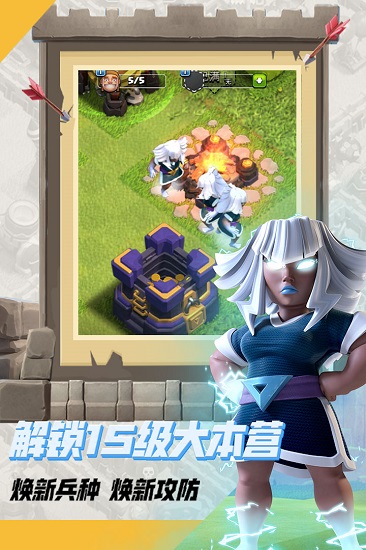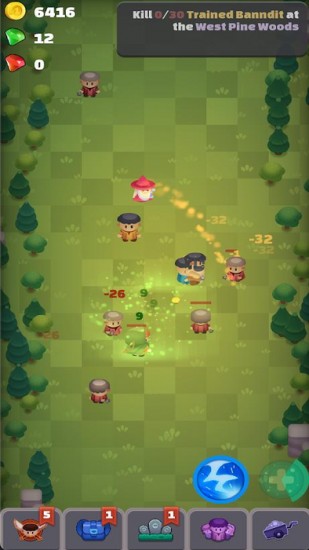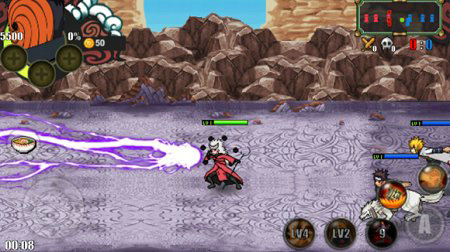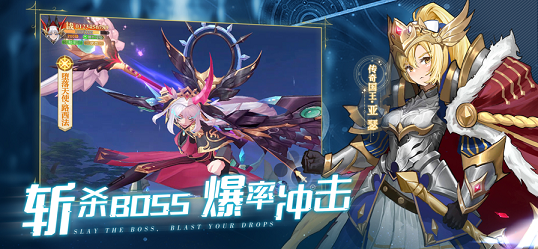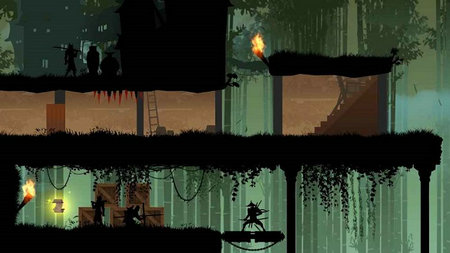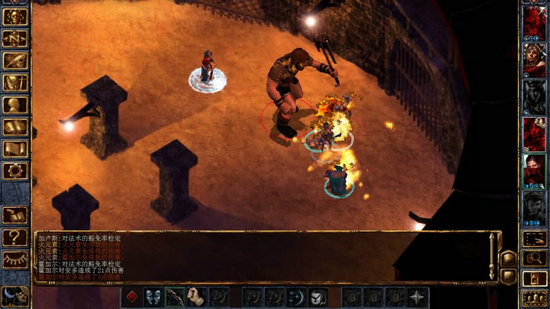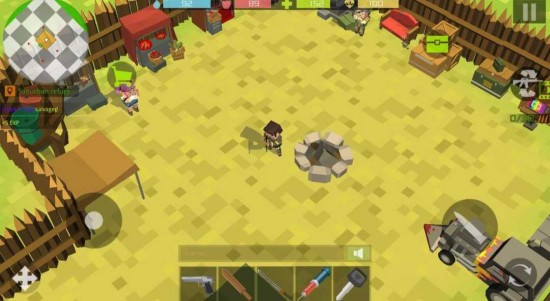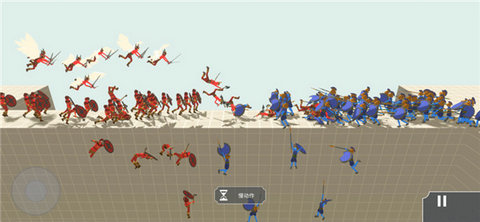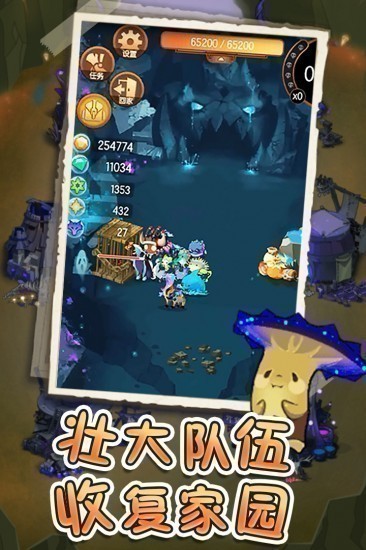《龙之纪元起源》部分Codex翻译之四(文化与历史篇)
游侠见习版主:doremigeng 原创
史诗的剧情少不了复杂故事背景资料的铺垫.因才疏学浅,故将英文原文奉上,如有翻译错误望高手不吝赐教!
感谢qwe12op 关于dead of night的翻译纠正,magicain关于Transcribe的翻译纠正;hang0326 关于Aeonar的翻译纠正;感谢DDDDDE对第三卷,第八卷以及第五十卷的翻译纠正;感谢adelinshark 对于第五十卷的翻译纠正;感谢yyxxyy对Brother Genitivi的翻译修正;感谢 hang0326 对第一百一十五卷的翻译修正;感谢rainhere 对地六十六卷的修正;感谢raydium 对第四十一卷,第四十三卷,第四十九卷的翻译修正;
另外:本帖欢迎各路英雄积极转载,请稍抬贵手署名出处game.ali213.net,万分感谢!由于防止他人盗用游侠汉化内容,新翻译的内容将暂不予发布,请各位耐心等待游侠汉化补丁推出,届时会一睹所有Codex的中文内容。
谨以此献给所有BioWare作品的爱好者
第四篇:文化与历史篇Codex
Codex Entry 93: On Dalish landships
For non-Dalish
The Dalish, who band together in small groups of blood relatives, travel in ornately carved wagons known as aravel, drawn by large white stags called halla. The aravel are a unique sight, beautiful in their swooping curvature, and adorned with broad hoods and bright silken cloths that flap in the wind, often displaying the noble banners that once flew over that family’s house. Most humans refer to the aravel as "landships," for in a strong wind it can often appear as if the elves travel in long boats with sails high overhead to announce their arrival (or warn others away). The halla are unique to the elves, and any but elven handlers consider them ornery and almost impossible to train. To the Dalish, they are noble beasts, superior in breeding to the horse. Certainly most humans would agree that the halla are as beautiful as the elves themselves; the fact that many imperial nobles maintain a bounty on halla horns that find their way into Tevinter is an affront the Dalish consider unforgivable.
Few among us can claim to have seen the Dalish landships up close. Any human who sees them on the horizon does well to head the other way. Few Dalish clans take kindly to humans intruding on their camps, and more than one tale tells of trouble-making humans who found themselves mercilessly filled with Dalish arrows.
--From In Pursuit of Knowledge: The Travels of A Chantry Scholar, by Brother Genitivi.
For Dalish PCs
"We are the Dalish: keepers of the lost lore, walkers of the lonely path. We are the last elvhen. Never again shall we submit."
--The Oath of the Dales
Someone once told me that humans flee when they see the sails of our aravels flying above the tops of trees. I say, good, let them flee. The humans took everything from us--our homeland, our freedom, our immortality. Whats a little fear compared to all the horrors inflicted upon us? I recite the Oath of the Dales to myself each day when I sleep and when I wake: "Never again shall we submit." Never again.
The keeper says that one day the Dalish will find a home that we can call our own. But why? Why should we tie ourselves to stone constructions like the humans and the dwarves? What is wrong with the life we have now? We owe nothing to anyone, we have no master but ourselves, and we go where the halla and the gods take us. There is nothing more wonderful than sitting on an aravel as it flies through the forest, pulled by our halla. We are truly free, for the first time in our peoples history. Why should we change this?
--From the journal of Taniel, clan hunter.
第九十三卷:Dalish精灵陆地船
非Dalish精灵的记载:
Dalish精灵,使一群那些以血亲关系凝聚在一起的小群体,旅行并居住在那些叫做aravel的装饰华丽的篷车内,由叫做halla的白色鹿进行牵引。Aravel有一个很独特的外表,优美的曲线,装饰着在风中飘舞的宽大的斗篷和光鲜的丝衣,通常作为某一个贵族家族标记与旗帜,在他们住处的上方飞舞。大多数的人类将aravel看作某种“陆地船”,因为在有大风的时候,常常能看到精灵们仿佛坐在船中航行一样,高高的风帆预示着他们的到来(或者警告其他人离开)。Halla对待精灵们是十分特殊的,任何非精灵的驯兽师会认为halla的脾气暴躁且难以驯服。但对于Dalish精灵来说,它们是高贵的动物,在出生的时候就比马要高贵。当然,大多数人类都会承认,halla就像精灵一样非常漂亮;事实上很多Tevinter帝国的贵族不惜花重金购买进入他们领土的halla的鹿角,而这一行为在Dalish眼中看来则是不可饶恕的。
在我们之中很少有人曾近距离亲眼见过Dalish的陆地船。任何在地平线上看到它们的人类都应当赶紧知趣地离开。很少有Dalish部落能宽容地对待入侵他们营地的人类,不只一个故事中都提到那些爱惹麻烦的人类最后浑身被射满了Dalish的箭矢。
--源自“追寻知识:一位教堂学者的旅行”,作者Genitivi修士。
Dalish精灵的记载:
“我们是Dalish精灵:知识遗产的守护者,道路上的独行者。我们是最后的纯正精灵。我们再也不会向任何人屈服。”
--Dales之誓言
曾经有人一度告诉我,人类当看到我们的aravels的风帆飞过树梢的时候就会逃跑。我说很好,让他们逃跑吧。人类夺走了我们的一切---我们的家乡,我们的自由,我们曾经不朽的能力。他们的那一点点恐惧怎么能和他们对我们的所作所为相比?我每天睡觉和苏醒之时都自己背诵Dales的誓言:“我们再也不会向任何人屈服。”再也不会。
长老们说终有一天我们Dalish精灵会找到属于我们的家乡。但是何必呢?我们为什么要让我们自己绑在像矮人和人类那种石头做的建筑中?我们现在的生活有什么不好?我们不欠任何人任何事,我们除了自己没有任何主人,我们去Halla和神所指引我们去的任何地方。没有任何事情比坐在由halla牵着,在树林中疾驰飞过的aravel上更美好的事了。在我们人民的历史上,我们第一次真正地自由了。我们为什么要改变这一切呢?
---摘自部落猎人Taniel的日记。
更多相关讨论请前往:龙之纪元起源论坛
>>查看龙之纪元起源全部攻略
游侠见习版主:doremigeng 原创
史诗的剧情少不了复杂故事背景资料的铺垫.因才疏学浅,故将英文原文奉上,如有翻译错误望高手不吝赐教!
感谢qwe12op 关于dead of night的翻译纠正,magicain关于Transcribe的翻译纠正;hang0326 关于Aeonar的翻译纠正;感谢DDDDDE对第三卷,第八卷以及第五十卷的翻译纠正;感谢adelinshark 对于第五十卷的翻译纠正;感谢yyxxyy对Brother Genitivi的翻译修正;感谢 hang0326 对第一百一十五卷的翻译修正;感谢rainhere 对地六十六卷的修正;感谢raydium 对第四十一卷,第四十三卷,第四十九卷的翻译修正;
另外:本帖欢迎各路英雄积极转载,请稍抬贵手署名出处game.ali213.net,万分感谢!由于防止他人盗用游侠汉化内容,新翻译的内容将暂不予发布,请各位耐心等待游侠汉化补丁推出,届时会一睹所有Codex的中文内容。
谨以此献给所有BioWare作品的爱好者
第四篇:文化与历史篇Codex
Codex Entry 93: On Dalish landships
For non-Dalish
The Dalish, who band together in small groups of blood relatives, travel in ornately carved wagons known as aravel, drawn by large white stags called halla. The aravel are a unique sight, beautiful in their swooping curvature, and adorned with broad hoods and bright silken cloths that flap in the wind, often displaying the noble banners that once flew over that family’s house. Most humans refer to the aravel as "landships," for in a strong wind it can often appear as if the elves travel in long boats with sails high overhead to announce their arrival (or warn others away). The halla are unique to the elves, and any but elven handlers consider them ornery and almost impossible to train. To the Dalish, they are noble beasts, superior in breeding to the horse. Certainly most humans would agree that the halla are as beautiful as the elves themselves; the fact that many imperial nobles maintain a bounty on halla horns that find their way into Tevinter is an affront the Dalish consider unforgivable.
Few among us can claim to have seen the Dalish landships up close. Any human who sees them on the horizon does well to head the other way. Few Dalish clans take kindly to humans intruding on their camps, and more than one tale tells of trouble-making humans who found themselves mercilessly filled with Dalish arrows.
--From In Pursuit of Knowledge: The Travels of A Chantry Scholar, by Brother Genitivi.
For Dalish PCs
"We are the Dalish: keepers of the lost lore, walkers of the lonely path. We are the last elvhen. Never again shall we submit."
--The Oath of the Dales
Someone once told me that humans flee when they see the sails of our aravels flying above the tops of trees. I say, good, let them flee. The humans took everything from us--our homeland, our freedom, our immortality. Whats a little fear compared to all the horrors inflicted upon us? I recite the Oath of the Dales to myself each day when I sleep and when I wake: "Never again shall we submit." Never again.
The keeper says that one day the Dalish will find a home that we can call our own. But why? Why should we tie ourselves to stone constructions like the humans and the dwarves? What is wrong with the life we have now? We owe nothing to anyone, we have no master but ourselves, and we go where the halla and the gods take us. There is nothing more wonderful than sitting on an aravel as it flies through the forest, pulled by our halla. We are truly free, for the first time in our peoples history. Why should we change this?
--From the journal of Taniel, clan hunter.
第九十三卷:Dalish精灵陆地船
非Dalish精灵的记载:
Dalish精灵,使一群那些以血亲关系凝聚在一起的小群体,旅行并居住在那些叫做aravel的装饰华丽的篷车内,由叫做halla的白色鹿进行牵引。Aravel有一个很独特的外表,优美的曲线,装饰着在风中飘舞的宽大的斗篷和光鲜的丝衣,通常作为某一个贵族家族标记与旗帜,在他们住处的上方飞舞。大多数的人类将aravel看作某种“陆地船”,因为在有大风的时候,常常能看到精灵们仿佛坐在船中航行一样,高高的风帆预示着他们的到来(或者警告其他人离开)。Halla对待精灵们是十分特殊的,任何非精灵的驯兽师会认为halla的脾气暴躁且难以驯服。但对于Dalish精灵来说,它们是高贵的动物,在出生的时候就比马要高贵。当然,大多数人类都会承认,halla就像精灵一样非常漂亮;事实上很多Tevinter帝国的贵族不惜花重金购买进入他们领土的halla的鹿角,而这一行为在Dalish眼中看来则是不可饶恕的。
在我们之中很少有人曾近距离亲眼见过Dalish的陆地船。任何在地平线上看到它们的人类都应当赶紧知趣地离开。很少有Dalish部落能宽容地对待入侵他们营地的人类,不只一个故事中都提到那些爱惹麻烦的人类最后浑身被射满了Dalish的箭矢。
--源自“追寻知识:一位教堂学者的旅行”,作者Genitivi修士。
Dalish精灵的记载:
“我们是Dalish精灵:知识遗产的守护者,道路上的独行者。我们是最后的纯正精灵。我们再也不会向任何人屈服。”
--Dales之誓言
曾经有人一度告诉我,人类当看到我们的aravels的风帆飞过树梢的时候就会逃跑。我说很好,让他们逃跑吧。人类夺走了我们的一切---我们的家乡,我们的自由,我们曾经不朽的能力。他们的那一点点恐惧怎么能和他们对我们的所作所为相比?我每天睡觉和苏醒之时都自己背诵Dales的誓言:“我们再也不会向任何人屈服。”再也不会。
长老们说终有一天我们Dalish精灵会找到属于我们的家乡。但是何必呢?我们为什么要让我们自己绑在像矮人和人类那种石头做的建筑中?我们现在的生活有什么不好?我们不欠任何人任何事,我们除了自己没有任何主人,我们去Halla和神所指引我们去的任何地方。没有任何事情比坐在由halla牵着,在树林中疾驰飞过的aravel上更美好的事了。在我们人民的历史上,我们第一次真正地自由了。我们为什么要改变这一切呢?
---摘自部落猎人Taniel的日记。
更多相关讨论请前往:龙之纪元起源论坛
>>查看龙之纪元起源全部攻略
Codex Entry 144: On early dwarven history
The Memories tell us that our kingdom once reached far beneath the mountains, and that the thaigs were almost beyond counting. Kal Sharok was the capital then, home to all the noble houses, and Orzammar was simply the home of the Miner and Smith castes.
It was with the Tevinter Imperium that things changed. Paragon Garal moved the seat of power to Orzammar to more closely oversee the trade that began with the surface. It seemed that our people were entering a new age of prosperity.
The Memories hold no explanations for the coming of the darkspawn, only questions. At first, they were rumors, noises in the Deep Roads, a lost traveler here and there. The Warrior Caste sent men to patrol the road, and thought the matter settled. We did not know that while we searched for them, they were engaged in a search of their own.
Sleeping deep in the Stone itself was the archdemon. They found him, and awakened him, and the Blight began.
The darkspawn poured out of the Deep Roads like smoke, then, and the Warrior Caste struggled to hold them back. Countless thaigs were lost in that first Blight. But, as ever, in the worst moments of our need, a Paragon arose. Paragon Aeducan led the defenses of Orzammar, and the dark horde was beaten back.
The cost of victory, however, was great. Much of the Deep Roads were sealed to hold back the darkspawn, cutting off thaigs and even whole cities forever.
--"Orzammar as a Kingdom," as told by Shaper Czibor
第一百四十四卷:矮人们早期的历史
记录者们告诉我们,我们的王国曾经一度扩张至山岭地下极远的地方,并且拥有着数不胜数的殖民地。Kal Sharok是那时候的首都,是所有贵族家族的家园,而Orzammar仅仅是矿工阶级和铁匠阶级的家园而已。
一切事情都因为Tevinter帝国而改变。矮人贤者Garal将权力的宝座移至了Orzammar从而能够能贴近地观察和地表人群的贸易活动。看起来我们的人民正在进入了一个全新的兴旺时期。
记录者却不能对之后到来的黑暗大军做出任何的解释,只有疑问。最初,他们只是一些传言,无底之路中传来的噪音,偶尔在那里发生的一些旅行者失踪事件。战士阶级的人派出了一些人去道路上巡逻,并且认为事情已经得到解决。我们却不知道当我们寻找他们的时候,他们却已经找到了他们所寻找的东西。
在石头下深深沉睡着的大恶魔。他们找到了他,并唤醒了他,于是天灾便降临了。
黑暗生物从无底之路中像烟雾一样的弥漫出来,而后战士阶级的人尝试着击退他们。在第一次天灾中无数的殖民地被遗弃。但是,就像在任何时代一样,在最危险的时刻中一位矮人贤者崛起了。Aeducan贤者领导了Orzammar的防御战,黑暗生物终于被击退。
然而胜利的代价却是昂贵的。无底之路的大部分都为了防止黑暗生物的入侵而被封死,切断了许多与殖民地甚至整座城市的联系。
---源自“作为一个王国的Orzammar”,由雕塑师Czibor所讲述。
Codex Entry 145: On golems
We were losing the war against the darkspawn. Slowly. A few men at a time, but losing all the same. The Warrior Caste was dwindling with each generation as more able-bodied men perished in their prime without fathering sons. With each generation, more of the Deep Road had to be sealed, more thaigs lost forever. The kings of Orzammar watched, and wondered how long it would be until nothing remained of our people but the Memories.
And then Paragon Caridin arose from the Smith Caste with a new weapon: Golems. Giant soldiers of living stone and metal, each one was an army. With the Paragons golems, we began to retake the lands we had lost. For a while, there was hope that victory, final victory, was coming.
But at the height of the war, Paragon Caridin disappeared, and with him, the means to make golems. Several forays were made into the Deep Roads to search for the Paragon, but nothing was ever found. Over time, the golems we had were damaged beyond repair, and we began our slide, once again, toward extinction.
--"Orzammar as a Kingdom," as told by Shaper Czibor
第一百四十五卷:傀儡石像
我们正在渐渐输掉与黑暗生物的战斗。慢慢地,每次只失去一点人,但总体上仍然走向失败。战士阶级的人数每代都在逐渐变小,因为越来越多有能力的人在他们正当壮年之时死去,还来不及延续后裔。随着一代代人的繁衍,无底之路更多的部分必须被封闭,更多的殖民地永远地逝去。Orzammar的国王一直关注着,并思考着大概多久之后我们的人们便会完全消失而只留下回忆。
后来,矮人贤者Caridin从铁匠阶级中崛起,并发明了他的新武器:傀儡石像。它们是巨大的活着的石头和钢铁组成的士兵,每一个都能抵挡一只军队。借助矮人贤者的傀儡石像,我们开始重新占领我们所失去的土地。并且在一段时间内,我们甚至看到了胜利的希望,最后的胜利,正在来临。
但是在战争的高潮时期,矮人贤者Caridin突然消失了,并且他还带走了制造傀儡石像的方法。仅管几只突击队被派遣到了无底之路中去寻找矮人贤者,但却什么也没有发现。随着时间的过去,我们所拥有的傀儡石像渐渐破损到了无法修复的程度,于是我们又走上了下坡路,慢慢地走向了灭绝的边缘。
---“作为一个王国的Orzammar”,由雕塑师Czibor所讲述。
Codex Entry 146: On the ruined fortress of Ostagar
Representing the furthest point of encroachment by the ancient Tevinter Imperium into the barbarian lands of the southeast, the fortress of Ostagar was once one of the most important defensive holdings south of the Waking Sea. It stood at the edge of the Korcari Wilds watching for any signs of invasion by the barbarians known today as the Chasind wilders. Straddling a narrow pass in the hills, the fortress needed to be by-passed to reach the fertile lowlands to the north and proved to be exceedingly difficult for the wilders to attack because of its naturally defensible position.
Like most imperial holdings in the south, Ostagar was abandoned after Tevinters collapse during the first Blight. It was successfully sacked by the Chasind wilders and then, as the Chasind threat dwindled following the creation of the modern Ferelden nation, fell to ruin completely.
It has remained unmanned for four centuries, though most of the walls still stand--as does the tall Tower of Ishal, named after the great archon that ordered its construction. Ostagar remains a testament to the magical power of the Imperium that created it.
--From Ferelden: Folklore and History, by Sister Petrine, Chantry scholar
第一百四十六卷:Ostagar堡垒的遗迹
代表着古老Tevinter帝国对于东南部野蛮人土地入侵的最远点,Ostagar的堡垒曾经一度是防御觉醒之海南部的重要阵地。它屹立在Dorcar荒野的边缘,注视着任何野蛮人---如今他们被叫做Chasind野人---入侵的迹象。
就像大多数在南方的帝国一样,Ostagar在第一次天灾后Tevinter帝国崩溃时便被遗弃了。而后它被Chasind野人们成功地掠夺,而后在当代的Ferelden国家建立后,Chasind的威胁逐渐减少,它便被完全地遗弃了。
它在四个世纪中都没有人对其加以修复,仅管大多数的墙壁仍然屹立着---高耸的Ishal塔也仍然健在,这座塔以下达建筑它命令的执政官的名字而命名。Ostagar仍然保留着一些帝国当初建立它时所留下的魔法力量。
--源自“Ferelden:乡间传奇和历史”,作者教会学者,Petrine修女。
Codex Entry 147: n account of the qunari conquest of Par Vollen
In the 30th year of the Steel Age, the first qunari ships were sighted off the coast of Par Vollen in the far north, marking the beginning of a new age of warfare.
History calls this the First Qunari War, but it was mostly a one-sided bloodbath, with the qunari advancing far into the mainland. Qunari warriors in glittering steel armor carved through armies with ease. Their cannons, the likes of which our ancestors had never seen, reduced city walls to rubble in a matter of seconds.
Stories of qunari occupation vary greatly. It is said they dismantled families and sent captives to "learning camps" for indoctrination into their religion. Those who refused to cooperate disappeared to mines or construction camps.
For every tale of suffering, however, there is another of enlightenment deriving from something called the "Qun." This is either a philosophical code or a written text that governs all aspects of qunari life, perhaps both. One converted Seheran reported pity for those who refused to embrace the Qun, as if the conquerors had led him to a sort of self-discovery. "For all my life, I followed the Maker wherever his path led me," he wrote, "but in the Qun I have found the means to travel my own path."
It has been said that the most complete way to wipe out a people is not with blades but with books. Thankfully, a world that had repelled four Blights would not easily bow to a foreign aggressor. And so the Exalted Marches began.
The greatest advantage of the Chantry-led forces was the Circle of Magi. For all their technology, the qunari appeared to harbor great hatred for magic. Faced with cannons, the Chantry responded with lightning and balls of fire.
The qunari armies lacked the sheer numbers of humanity. So many were slain at Marnas Pell, on both sides, that the Veil is said to be permanently sundered, the ruins still plagued by restless corpses. But each year, the Chantry pushed further and further into the qunari lines, although local converts to the Qun proved difficult to return to Andrastes teachings.
By the end of the Storm Age, the qunari were truly pushed back. Rivain was the only human land that retained the qunari religion after being freed, and its rulers attempted to barter a peace. Most human lands signed the Llomerryn Accord, excepting the Tevinter Imperium. It is a shaky peace that has lasted to this day.
--From The Exalted Marches: An Examination of Chantry Warfare, by Sister Petrine, Chantry scholar
第一百四十七卷:Qunari对Par Vollen的征服
在钢铁纪元的第三十年,第一支Qunari的船队在Par Vollen的遥远北方被发现,标志着一个新时代战事的开始。
历史称呼这件事为第一次Qunari战争,但是它更像是一面倒的大屠杀,当Qunari进入了更深的主大陆地区时。Qunari战士们穿着他们闪闪发光的钢铁盔甲,在敌军中轻易地杀出一条血路。他们的加农炮,那种我们祖先们从未见过的东西,在几秒中之内就将我们城市的城墙粉碎成碎片。
关于Qunari占领的故事流传的很广。据说他们拆散了许多家庭并将俘虏们送去“再造营”接受他们宗教的熏陶。那些拒绝合作的人很快便消失在了矿井与建筑工地中。
而由教会领导的部队的优势则是魔法师议会的力量。仅管拥有他们的科技,Qunari似乎对魔法表现出了极端的憎恨。面对加农炮,教会用闪电和火球进行了应对。
Qunari军队缺少对付人类的数量优势。许多人在Marnas Pell被杀死,双方的人都损失惨重,据说因此那里的中间结界变得十分脆弱,那的废墟里仍然被许多不眠的尸体所侵扰。但是随着每过一年,教会都将Qunari的防线不断地逼退,仅管那些被Qun驯化了的当地人十分难以重新回到关于Andraste的教导中来。
在风暴纪元的最后,quanri完全地被击退了。Rivain是唯一在被解放后还保留着qunari信仰的人类领地,而它的统治者倾向于达成某种妥协。除了Tevinter帝国,大多数的人类领地都签署了Llomerryn协议。那摇摇欲坠的和平一致维持直至今。
--源自“圣战:对教会战力的检验”,作者教会学者,Petrine修女。
更多相关讨论请前往:龙之纪元起源论坛
>>查看龙之纪元起源全部攻略
Codex Entry 94: The history of the elves from Andraste to the destruction of the Dales
For Dalish PCs
You will hear tales of the woman Andraste. The shemlen name her prophet, bride of their Maker. But we knew her as a war leader, one who, like us, had been a slave and dreamed of liberation. We joined her rebellion against the Imperium, and our heroes died beside her, unmourned, in Tevinter bonfires.
But we stayed with our so-called allies until the war ended. Our reward: A land in southern Orlais called the Dales. So we began the Long Walk to our new home.
Halamshiral, "the end of the journey," was our capital, built out of the reach of the humans. We could once again forget the incessant passage of time. Our people began the slow process of recovering the culture and traditions we had lost to slavery.
But it was not to last. The Chantry first sent missionaries into the Dales, and then, when those were thrown out, templars. We were driven from Halamshiral, scattered. Some took refuge in the cities of the shemlen, living in squalor, tolerated only a little better than vermin.
We took a different path. We took to the wilderness, never stopping long enough to draw the notice of our shemlen neighbors. In our self-imposed exile, we kept what remained of elven knowledge and culture alive.
--"The End of the Long Walk," as told by Gisharel, keeper of the Ralaferin clan of the Dalish elves
For non-Dalish PCs
Many forget that when Holy Andraste called out to the oppressed peoples to rise up, it was the elves who answered her first.
The humblest slaves of the Imperium became her vanguard, and when victory came, they were rewarded accordingly: They were given a land in what is now the south of Orlais, called the Dales.
A great exodus of elves undertook the journey to their new home, crossing ocean, desert, and mountain. Their city, the first elven city since the fabled Arlathan, was called Halamshiral. A new era had begun for the elves.
But the old era wasn’t through with them. In their forest city, the elves turned again to worship their silent, ancient gods. They became increasingly isolationist, posting Emerald Knights who guarded their borders with jealousy, rebuking all efforts at trade or civilized discourse. Dark rumors spread in the lands that bordered the Dales, whispers of humans captured and sacrificed to elven gods.
And then came an attack by the elves on the defenseless village of Red Crossing. The Chantry replied with the Exalted March of the Dales, and the era of the elven kingdom came to an end. Halamshiral was utterly destroyed, the elves driven out, scattered, left to survive on goodwill alone.
--From Ferelden: Folklore and History, by Sister Petrine, Chantry scholar.
第九十四卷:从Andraste到Dales的毁灭那段精灵的历史
Dalish精灵的记载:
你们会听到很多关于Andraste这个女人的故事。那些麻瓜们把她命名为先知,造物主的新娘。但是我们只认为她是一名战争的领袖,并且一度像我们一样作为奴隶并期盼自由。我们的人民加入了她对抗帝国的起义,我们的英雄们战死在了她的身边,被火化时却没有人去哀悼。
但我们一直支持者我们所谓的盟友直到战争的结束。给我们的奖赏则是:Orlais南部一片叫做Dales的领土。于是我们便向着我们新的家园展开了漫长的旅途。
Halamshiral,“旅途的终点”就是我们曾经的首都,建立在了人类所远远不能触及的范围之外。我们终于再次地忘记了时间对我们的影响。我们的人民开始了缓慢地寻找并复原那些在被奴役中丢失的文化和传统。
但这并没有持续很久。教会先是向Dales派来了传教士,当他们被赶出去之后,则派来了圣殿武士。我们被从Halamashiral驱逐了出去,人民也四散而逃。有一些人逃到了麻瓜的城市里,生存在肮脏而艰苦地环境下,被人们像害虫与歹徒一样对待着。
我们则走了一条不同的路。我们选择了荒野,从不在一个地方过多地停留以免招致那些麻瓜的注意。在我们自我对自我地放逐中,我们保留着那些精灵的知识和文化生存了下来。
--“漫长旅途的结束”,由Dalish精灵的Ralaferin部落长老Gisharel所讲述
非Dalish精灵的记载:
许多人都忘记了,当神圣的Andraste呼唤受苦的人民站起来的时候,是精灵们最先响应了她。
那些帝国最卑微的奴隶成为了她的先锋,且当胜利到来的时候,他们受到的应当的奖赏:他们被给予了一片位于Orlais南方的领地,叫做Dales。
一大批出走的精灵通过旅行到了他们新的家园---穿越了海洋,沙漠和高山。他们的城市,是自Arlathan寓言中提到过以来的第一座精灵城市,叫做Halamshiral。一个全新的时代为精灵们开启了。
但旧的时代并没有放过他们。在他们森林的城市里,精灵们又开始膜拜他们那远古而沉寂的神。他们越来越变成孤立主义者,忌惮地部署了守护他们边界的Emerald骑士,破坏了贸易所作的贡献以及那些文明的布道。暗地里有人传言,在Dales的边界上有些人类被精灵绑架并献祭给了他们的众神。
后来则发生了精灵们袭击没有防御力量的Red Crossing村庄的事件。教会则做出了对Dales发动圣战的决定,于是精灵王国的时代走到了末路。Halamshiral被彻底地毁灭了,精灵们被赶了出去,他们的人民再次地分散开来,只能听天由命。
--来自“Ferelden:乡间传奇与历史”,作者是教会学者Petrine修女
Codex Entry 95: The history of the elves migration to Halamshiral
When our people left Tevinter, we had nothing except the knowledge that for the first time in countless centuries, we were free.
It was Shartans dream that one day we we would have our own homeland, where we could live as we chose. After the long struggle that claimed the lives of many, even Shartan himself, we were granted the Dales. And though the Dales were to the south of the land of Orlais, and a long way off from Tevinter, it mattered little. We were going home. And so we walked.
We called our journey the Long Walk, for that was what it was. We walked with what little we had on our backs. Some walked without shoes, for they had none. Whole families, women with infants, the old and young alike--all of them made their way across the land on foot. And if one of our people could no longer walk, we carried him, or sometimes left him behind.
Many perished along the way. Some died of exhaustion, others simply gave up and fell by the wayside. A great number were set upon by human bandits, even though we had few possessions. Along the way, a growing number began to bemoan the decision to leave Tevinter. "At least in Tevinter," they said, "we had food, and water, and shelter. What do we have here? Nothing but the open sky and the prospect of the never-ending road ahead." Some turned back toward Tevinter. But most of us continued walking.
And the gods rewarded those of us who did not waver by bringing us to the Dales. Our people called the new city Halamshiral--"the end of the journey." And for a time, it was home.
--As told by Gisharel, keeper of the Ralaferin clan of the Dalish elves
第九十五卷:精灵们向Halamshiral迁徙的历史
当我们的人民离开了Tevinter,我们什么都没有,只知道在历史上我们第一次地真正自由了。
Shartan的梦想是终有一天我们能够拥有自己的家乡,我们能够在那里按我们的意愿生活。在经过了夺去了无数人生命的争斗后,甚至最后Shartan本人也在斗争中牺牲,我们最终得到了这片叫做Dales的土地。尽管Dales处于Orlais大陆的南方,并且距离Tevinter极其遥远,但这些都并不重要。我们终于能够回家了。于是我们出发了。
我们把这次迁徙称作“漫长的旅途”,因为这是它的实质。我们带着身上仅有的东西出发了。有些人甚至连鞋子也没有。在整个家庭中,怀抱着婴儿的妇女,老人和年轻人都是一样---他们都步行穿越了整个大陆。当我们之中的一些人走不动的时候,我们就背起他们走,但有些时候也只得将他们抛弃在身后。
在路途中损失很许多人。一些因筋疲力尽而死去,其他的人则简单地放弃,并倒在了路边。一大批的人被人类强盗所洗劫,尽管我们并没有什么值钱的物品。在路途中,有越来越多的人开始哀叹当初离开Tevinter的决定。“在Tevinter的时候”他们说,“我们起码拥有食物,水,以及栖息的场所。而我们现在拥有什么呢?只有一片开阔的天空和看不到尽头的路途。”有一些人回身返回了Tevinter。但是我们中的绝大多数仍然坚持着前进。
神祗奖赏了那些没有动摇的人,最终将他们带领到了Dales。我们的人民称呼这座新的城市Halamshiral---“旅途的终点”并且在后来的一段时期内,它一直作为我们的家园而存在。
-----由Dalish精灵的Ralaferin部落长老Gisharel所讲述
更多相关讨论请前往:龙之纪元起源论坛
>>查看龙之纪元起源全部攻略
Codex Entry 96: On the lost immortality of the elves
To the ancient elves who existed during the time of Arlathan, uthenera was an act of reverence. Elves did not age. They were not immortal, but they did not suffer from deterioration of mind or body. They suffered only from a deterioration of the spirit.
It did not happen often, but the oldest of the elves were said to reach a point where they became weary of life. Memories became too much to bear, and rather than fade into complacency, they voluntarily stood aside to let newer generations guide their people.
Uthenera means "the long sleep," in which the elder would retire to a chamber that was one part bed and one part tomb. To great ceremony from all the extended family, the elder would succumb to a slumber from which they would not wake for centuries, and often never. In time, the body would deteriorate and the elder would die in truth. All the while, family would continue to visit the chamber to pay respect to one who made such a great sacrifice.
With the arrival of humans and the quickening of elven blood that ensued, the practice of uthenera began to fade. When Arlathan fell, it ceased forever.
--From What Has Passed, by Hassandriel, Lord of Halamshiral, 2:7 Glory
第九十六卷:精灵们逝去的不朽
存在于Arlathan时代的远古精灵们,uthenera是一种受人尊敬的举动。那时的精灵们并不会衰老。尽管他们并不是真正不朽之人,但他们的躯体和心智都不会衰老与凋零。唯一能购凋零的,只有他们的灵魂。
虽然这并不是经常发生的事情,但据传说一些上了年纪的精灵会对自己的生命感到越来越厌倦。他们那逐渐增多的回忆渐渐地无法令他们承受和摆脱,于是他们便选择了急流勇退,取而代之的让年轻的一代来领导指引他们的人民。
精灵语的Uthenra本意是“长眠”。精灵老者们会来到一个既是床又是坟墓的房间里。在由他们的家族举行完仪式后,这些老者们会进入长达数个世纪之久的长眠,有些时候则长达永远。这时候随着时间的推移,他们的身体便会渐渐腐坏,于是这些精灵老者才会达成真正意义上地死亡。而在这期间,他家族成员们还可以继续前往这些房间来看望他,以表达他们对这些付出了自我牺牲的长者们的崇敬。
而伴随人类的到来,精灵们的鲜血与死亡再不是那么漫长而困难的事,终于地让uthenera的仪式渐渐地被遗忘在了暗淡之中。最终,当Arlathan陷落的时候,它便永远地失传了。
---来自“逝去的时光”,作者Halamshiral的领主Hassandriel,2:7荣耀纪元。
Codex Entry 97: An explanation of elven tattoo art
For Dalish PCs
When the children of our people came of age, they earn the privilege of wearing the vallaslin, the blood writing. It sets us apart from the shemlen, and from the elves who have thrown their lot in with them. It reminds us that we will never again surrender our traditions and beliefs.
The ritual deserves great reverence. The one who is to gain the vallaslin must prepare by meditating on the gods and the ways of our people, and by purifying the body and the skin. When the time comes, the keeper of the clan applies the blood writing. This is done in complete silence. Cries of pain are signs of weakness. If one cannot tolerate the pain of the blood writing, they are not ready to undertake the responsibilities of an adult. The keeper may stop the ritual if they decide that the one gaining the vallaslin is not ready. There is no shame in this, for all children are different, and our ancestors once took centuries to come of age.
--As told by Gisharel, keeper of the Ralaferin clan of the Dalish elves.
For non-Dalish PCs
After my encounter with the Dalish elves on the road to Nevarra, I studied every book on the elves I could find. I sought out legends and myths and history and tried to make sense of it all. But there is only so much one can learn from books. I knew that in order to truly understand the Dalish, I would have to seek them out--a dreadful idea, in hindsight. In my defense, I was young--and also inebriated when the idea popped into my head. Unfortunately, even after I had regained some measure of sobriety, the idea still held appeal. It proved remarkably resistant to my attempts to ignore it.
I gave in after months of that nagging thought at the back of my head and set out to learn about the Dalish first-hand. I tramped through the forests bordering Orlais for weeks before I finally found--or was found by--a Dalish hunter. I stumbled into one of his traps and suddenly was hanging from a tree with a rope about my ankles.
So there I was, defenseless, upside down with my robe over my head, my underclothes on display. Descriptions of my predicament might elicit laughter these days, but trust me when I say it was a situation I would not wish on anyone. Thankfully, my ridiculous appearance may have caused my captor to stay his hand--what threat is a silly human with his pants showing?
And so he sat, made a small fire, and began to skin the deer he had caught. I soon mustered the courage to speak. I tried to assure him that I was not there to harm him--but he laughed at this and replied that if I were there to harm him, I had failed terribly. Eventually we got to talking, and when I say talking, I mean that I asked him questions, and occasionally he would deign to answer.
He told me that while some Dalish actively seek out human travelers to rob or frighten, most of his people would rather be left alone. He seemed to believe that punishing the humans for past actions only led to more violence. I asked him about the intricate tattoos on his face; he told me they were called vallaslin--"blood writing." His were symbols of Andruil the Huntress, one of the most highly revered elven goddesses. He said the Dalish mark themselves to stand out from humans and from those of their kin who have chosen to live under human rule. He said the vallaslin remind his people that they must never again surrender their beliefs.
When he finished skinning the deer, he cut me down. By the time I had righted myself and conquered the dizziness of all the blood rushing out of my head, he was gone.
I do not recommend that my readers seek out the Dalish for themselves. I was very lucky to have met the man that I did, and to have walked away from our meeting unscathed. Perhaps the Maker watches over those who seek knowledge with an open heart; I certainly would like to think so.
--From In Pursuit of Knowledge: The Travels of A Chantry Scholar, by Brother Genitivi
第九十七卷:精灵刺青艺术的一种解释
Dalish精灵的记载:
当我们的孩子们成长到一定年龄后,他们就赢得了佩戴vallaslin----血痕的权利。这将我们同麻瓜们,以及那些和麻瓜一起生活的精灵们区分开来。它提醒着我们将永远不再放弃我们的传统和信仰。
这个仪式需要对其无比的尊敬。接受vallaslin的人必须做好一系列的准备,他们必须在冥想中思考众神以及我们的生活方式,继而需净化自己的身体和皮肤方可。当时间到来时,部落的长老将亲自为你授予血痕。在仪式过程中不可以发出声一点声音。如果因为痛苦而叫喊则会被视为是懦弱的表现。如果一个人不能够忍受血痕所带来的痛苦的话,那么他将被视为还没有准备好接受作为一个成人的责任与义务。长老们如果认为一个人还没有做好准备接受vallaslin则可以停止仪式。这并不可耻,因为所有的孩子都是不同的,而我们的祖先曾经花费了数个世纪才会成年。
-----由Dalish精灵的Ralaferin部落长老Gisharel所讲述
非Dalish精灵的记载:
在我去往Nevarra的途中碰到了Dalish精灵后,我学习了我所能找到的所有关于精灵的书籍。我在传说和神话以及历史中寻找能说明它的记载。但是人不能从书本上学得一切。我知道如果想真正的了解Dalish精灵,我必须去寻找他们---事后想想,这真是一个危险的主意。我想辩护两句的是,那时候我还年轻---而且总是被突然浮现在脑中的想法所打动。不幸的是,即使是在我重新恢复了理智的时候,这个念头仍然挥之不去。尽管我尽力尝试,但是始终无法忘却它。
过了几个月,我再也无法容忍这个想法在我的脑后盘旋了,于是我终于出发去寻找Dalish精灵以便能够第一手地学习他们。我在Orlais边境的森林中徘徊了数周之久,直到最终我终于找到了一名Dalish猎人----或者被他找到了我。我一头栽进了他的陷阱中而后,被一根拴住我脚踝的绳子倒挂在了一棵大树的半空中
这就是我当时那无助的局面,我的长袍子盖到了我的脸上,内衣全都露了出来。也许这个情况会在现在引起大笑,但相信我,我可不想这种处境发生在任何人身上。谢天谢地的是,我当时那荒诞的外表致使抓住我的人没有立刻动手解决我----一个把内裤露在了外面的人类能对他造成什么威胁呢?
于是他坐了下来,生起了一小团篝火,并开始为他猎来的鹿剥皮。我很快便鼓起勇气开口说话。我尝试向他保证我绝不是去那里伤害他的---但他却大笑着说,如果我是去那里伤害他的,那我失败的也太惨了。于是我们开始了聊天,而我所谓的聊天,就是由我一直问问题,而他只偶尔地回答我一两句。
他告诉我当有些Dalish精灵主动去寻找人类的旅行者并进行抢劫和恐吓的时候,他的人群却更喜欢独立起来。他貌似相信过去那些主动去惩罚人类的做法只会招致更多的暴力。当我问他脸上为什么有那错综复杂的刺青的时候;他告诉我他们管那叫vallaslin---“血痕”。他的血痕是Andruil狩猎女神的象征,一位精灵中最受尊敬的女神之一。他说Dalish精灵用刺青将他们自己同人类和那些生活在人类统治下的亲戚们分别开来。他说vallaslin提醒着他的人民他们将永不放弃自己的权益。
当他剥完了那只鹿后,他把我放了下来。当我刚从涌上脑袋的血造成的晕眩中恢复过来的时候,他已经消失不见了。
我不建议我的读者们自己出发去寻找Dalish精灵。我很幸运发现我的是那个人而不是别人,因此我才能毫发无损地离开。也许造物主守望着那些怀着一颗开放的心去寻求知识的人吧;我当然愿意这么想。
---源自“追寻知识:一位教会学者的旅行”,作者Genitivi修士
Codex Entry 100: An account of the nation of Antiva
In the rest of the civilized world, it is common belief that Antiva has no king. I assure you, gentle readers, that this is untrue. The line of kings in Antiva has remained unbroken for two and a half thousand years--it is simply that nobody pays any attention to them whatsoever.
The nation is ruled in truth by a collection of merchant princes. They are not princes in the literal sense, but heads of banks, trading companies, and vineyards. Their power is conferred strictly by wealth.
But Antiva is not primarily renowned for its peculiar form of government, nor for its admittedly unparalleled wines. Antiva is known for the House of Crows. Since Antivans are well-known for being good at everything but fighting, it is more than a little ironic that Antiva possesses the most deadly assassins in the world. Their fame is such that Antiva keeps no standing army: No king is willing to order his troops to assault her borders, and no general is mad enough to lead such an invasion. The attack would likely succeed, but its leaders would not see the day.
--From In Pursuit of Knowledge: The Travels of a Chantry Scholar, by Brother Genitivi
第一百卷:Antiva国家的记载
在其他的文明世界中,通常认为Antiva没有国王。我向你保证,高尚的读者,这并不是真的。Antiva的国王血脉在两千五百年中从未断过---只是从来没有人注意过他们而已。
这个国家实际上是由一群商界王子们所统治。他们不是传统意义上的王子,然而是银行,贸易公司,以及葡萄园的主人。他们的权力完全按照财富的多少来划分。
但是Antiva并不是因其政府的形式而知名,也不是因为它最棒的葡萄酒。Antiva因乌鸦家族而知名。人们普遍传说Antiva的人们除了打斗以外什么都擅长,讽刺地是Antiva拥有着世界上最致命的刺客。他们的名声致使了Antiva并没有任何正规军队:因为没有国王愿意派部队去攻击Antiva的边境,并且也没有将军疯狂到愿意统领这样的进攻。虽然攻击行动很可能最终会成功,但它的领袖却肯定无法活着看到那天。
--源自“追寻知识:一名教会学者的旅行”,作者Genitivi修士。
更多相关讨论请前往:龙之纪元起源论坛
>>查看龙之纪元起源全部攻略
Codex Entry 101: On the Avvar peoples
Driven across the Frostbacks in ancient times, the Alamarri tribesmen split into three groups: One settled the Ferelden Valley, one was pushed into the Korcari Wilds, and the last returned to the mountains. Modern Fereldans bear little resemblance to their Alamarri ancestors, and the Chasind remember few of their traditions, but the Avvars have changed little throughout the ages.
Like the Chasind, the Avvars are not a united people. Each tribe fends for itself and is beholden only to its thane. They still follow their own gods: Korth the Mountain-Father, Hakkon Wintersbreath, The Lady of the Skies, as well as dozens of animal gods never named to outsiders.
Nothing lasts in the mountains. Wind and rain eventually eat away the strongest holds. Valleys that were arable one generation are locked in year-round ice the next. Game is constantly on the move. Even among themselves, the Avvar make no absolute promises: They wed by a tradition in which the groom struggles to untie a tightly knotted rope while the bride sings a hymn to one of the gods. However many knots he has undone by the time her song ends is the number of years she will spend with him. Lowlanders often forget that there is no such thing as a permanent alliance in the Frostbacks. --From Ferelden: Folklore and History, by Sister Petrine, Chantry scholar
第一百零一卷:Avvar的人民
在远古时代被赶着穿越Frostbacks山脉的Alamarri部落分成了三个不同的人群:一群定居在了Ferelden的溪谷中,一群被逼进了Korcari荒野,而最后的一群则回到了大山之中。现代的Ferelden人们很少继承他们那Alamarri祖先的特点了,Chasind人只记得很少他们的传统,但是Awars人却未被岁月对他们产生什么影响。
就像Chasind人们那样,Awars人并不是统一的。每一个部落只考虑自己的利益并且只听命于他们的领主。他们仍然只信仰自己的神灵:山岭之神Korth,冬息之神Hakkon,天空女神,以及数不胜数的不为外界所知的动物之神。
在山谷中任何东西都无法恒久永存。风和雨水最终会腐蚀掉最坚硬的事物。溪谷之民的这一代人能以耕种为生,下一代人则被终年不化的冰雪封了起来。游戏规则始终在变。即使是在他们自己的人群中间,Awar也从不做出绝对的承诺:他们结婚的时候,新郎忙着解开一个又一个打成死结的绳扣,而新娘则在另一边唱神的赞美歌。当歌声结束的时候,新郎解开了多少个扣子,新娘就会跟他定下为期多少年的婚约。而平原的人们就常常忘记了在Frostback的人民中并没有永恒的联姻。
---“来自Ferelden:乡间传奇和历史”,作者教会学者Petrine修女。
Codex Entry 102: The Bannorns role in Fereldan politics
The central Ferelden Valley has always been a paradox: No single bann holds more than a few dozen leagues of farmland, yet together they govern a greater territory than all the teyrns and arls combined. This collection of independent banns is known as the Bannorn, and it is the heart of Fereldan politics.
No person has ever sat upon the throne of Ferelden without first winning the approval of the Bannorn. Queen Fionne, who had the misfortune to take the throne in the eighteenth year of the Steel Age, wrote of the Bannorn, "There have been three wars this year fought over elopements. Five fought over wool. And one started by an apple tree. It isnt even winter yet. Who would believe that these same banns, now trying so hard to kill one another, just last year united to give me the crown?"
--From Ferelden: Folklore and History, by Sister Petrine, Chantry scholar
第一百零二卷:Fereldan政治中男爵会的角色
Ferelden的中心地带总是矛盾重重:没有一个男爵能够拥有超过十二处以上的农田。然而他们的土地如果加起来则超过了所有伯爵和公爵的总和。这些独立的男爵们联合在一起便叫做男爵会,同时它也是Fereldan政治的核心。
没有一个人能够登上宝座除非他已经得到了来自男爵会的支持和认可。钢铁纪元时的Fionne皇后,那个不幸在十八岁就接任了国王宝座的人,在给男爵会写的一封信中说道:“在过去的一年中发生的战争,三次是因为私奔引起的,五次是因为羊毛引起的。甚至还有一次是为了一棵苹果树引起的。这还没有到冬天呢。谁会相信这些如此卖力互相残杀的男爵们,刚刚在去年联合了起来并赐予了我王冠呢?”
---源自“Ferelden:乡间传奇与历史,作者教会学者,Petrine修女”
Codex Entry 103: A story of the Brecilian Forest
There are places in the Brecilian Forest where the Veil is so thin the difference between awake and dreaming is next to nothing. In one such place, a wood-shaper was born under such unfortunate stars that his mother named him Abelas, which means "sorrow." And he lived up to his name. He could keep no apprentices, and lost his stock of bows in mishap after mishap, until finally he had nothing. The rest of the clan began to fear that his ill luck would harm them, too, and whispered among themselves of casting him out.
Abelas heard them and resolved to change his luck, and so went into the forest alone to seek a suitable tree from which to make bows.
At last he spied a young rowan growing beside a stream. He drew his axe, and the tree cried out in fear, begging to be spared. But Abelas said, "If I do not take your life, mine will surely end." With two strokes he felled the tree. From the tree, he made the finest three bows he had ever crafted. Pleased, Abelas returned to camp and gave his bows to the hunters at once.
By nightfall, however, the camp was in an uproar. The hunters had returned with braces of hares which, when cut open, revealed only worms and sawdust. The elder said it was a sign that the hunters had robbed some spirit of its host, for it is well known that spirits do not go about the waking world on their own, but inhabit another creatures body. The elder worked a charm to banish the spirit back to the Fade, and the clan went to sleep hungry.
The next day, the hunters brought back a doe, and again the beast bled sawdust. Now the clan began to fear the spirit would starve them, and wondered what they had done to deserve it. Abelas came forward then and told of the rowan tree. The Elder considered for a long time before declaring that they must replace what Abelas had taken from the spirit. So he sent the hunters to dig up a rowan sapling, and bring it, living, to the camp.
There the elder ordered the sapling planted, and appealed to the spirit for forgiveness.
There was a terrible sound then, as if the whole forest were crying out in protest. Darkness fell upon the camp, though it was just past midday. And when the darkness passed, a rowan grove, every tree bearing the frozen face of a terrified elf, stood where the camp had been. From then on, it was forbidden in every clan to cut living trees in the Brecilian Forest. The spirits know nothing of forgiveness.
--"The Rowan Grove: A Dalish Tale," from Ferelden: Folklore and History, by Sister Petrine, Chantry scholar
第一百零三卷:关于Brecilian森林的故事
在Brecilian森林中有些地带的中间结界十分薄弱,在那里 清醒和梦境的世界之间几乎没有分别。就在一个这样的地方,一位不幸的雕木匠在灾星下出生了。他的妈妈便给他取名为Abelas,代表“悲哀”的意思。而他也人如其名。从来无法成功地指导任何学徒,且总是因一些小意外而损失他所雕刻的木弓,直至最后他一无所有。部落里的其他人开始担心他那倒霉的运气会影响带他们,于是纷纷议论要驱逐他出去。
Abelas听到后便下定决心要改变他的运气,于是一个人走进了森林中去寻找一棵能够让他雕刻为弓的树木。
最终,他看到了一颗生长在小溪边的花楸木。而当他抽出了斧头,那颗树却突然在恐惧中哭了出来,并乞求他予以怜悯。但Abelas说“如果我不取你的生命的话,我的生命就终结了。”于是他两下就砍倒了那颗树。并用这颗树的木头,制作了他从未做过的三把最好的弓。Abelas高兴地回到了营地并把这些弓赠与了猎人们。
当夜幕降临的时候,营地里面突然一片哗然。猎人们带着狩猎回来的野兔刚刚回到营地,然而当刨开这些野兔的时候,却发现里面长满了蠕虫与木屑。长老们说这说明猎人们夺取了某些生灵的宿主,否则众所周知灵魂们绝不会主动离开自己的世界而来到活人世界侵占另一个生物的躯体。长老施放了一个魔咒将这个灵魂驱赶回了暗物质界中,部落的人也只得在饥饿中纷纷睡去。
第二天,猎人们又带回了一只雌鹿,而再一次地它身体里面充满了木屑。于是部落的人开始恐惧,认为灵魂要让他们饿死在饥荒之中,且开始纳闷他们究竟做了什么冒犯神灵的事。于是Abelas只得走上前并讲述了关于那个花楸木的事情。长老思考了很长的时间后并最终决定,必须归还Abelas从那个树木处夺走的东西。于是他派出了猎人去挖一棵花楸木的树苗,并将它活着带回营地。
长老命令把树苗种在那里,并祈求灵魂的宽恕。
继而突然发生了一声可怕的声音,好像整个森林都在抗议。黑暗笼罩了这片营地,而此时却是刚刚中午。当黑暗过去后,一片花楸木长了出来,而营地原本的地方变成了一片树林,且每颗花楸木上都带着一张面带恐惧的精灵的脸。于是从那以后,各个部落都禁止人们在Brecilian森林中砍伐活着的树木。因为灵魂们从不知宽恕。
--“花楸木的树林:一段Dalish精灵的故事”来自“Ferelden:乡间故事与历史”,作者是教会学者Petrine修女。
Codex Entry 104: A discussion of the Chantry calendar
For most good folk, the details of our calendar have little purpose. It is useful only for telling them when the Summerday festival will be held, when the snows are expected to begin, and when the harvest must be complete. The naming of the years are a matter for historians and taxmen, and few if pressed could even tell you the reason that our current Age is named after dragons.
It is 9:30 Dragon Age, the thirtieth year of the ninth Age since the crowning of the Chantry’s first Divine.
Each Age is exactly 100 years, with the next Ages name chosen in the 99th year. The scholars in Val Royeaux advise the Chantry of portents seen in that 99th year, and Chantry authorities pore over the research for months before the Divine announces the name of the imminent Age. The name is said to be an omen of what is to come, of what the people of Thedas will face for the next hundred years.
The current Age was not meant to be the Dragon Age. Throughout the last months of the Blessed Age, the Chantry was preparing to Declare the Sun Age, named for the symbol of the Orlesian Empire, which at that time sprawled over much of the south of Thedas and controlled both Ferelden and what is now Nevarra. It was to be a celebration of Orlesian imperial glory.
But as the rebellion in Ferelden reached a head and the Battle of River Dane was about to begin, a peculiar event occurred: a rampage, the rising of a dreaded high dragon. Dragons had been thought practically extinct since the days of the Nevarran dragon hunts, and they say that to see this great beast rise form the Frostbacks was both majestic and terrifying. As the rampage began and the high dragon decimated the countryside in its search for food, the elderly Divine Faustine II abruptly Declared the Dragon Age.
Some say the Divine was declaring support for Orlais in the battle against Ferelden, since the dragon is an element of the Dufayel family heraldry of King Meghren, the so-called Usurper King of Ferelden. Be that as it may, the high dragon’s rampage turned towards the Orlesian side of the Frostback Mountains, killing hundreds and sending thousands more fleeing to the northern coast. The Fereldan rebels won the Battle of River Dane, ultimately securing their independence.
Many thus think that the Dragon Age will come to represent a time of violent and dramatic change for all of Thedas. It remains to be seen.
--From The Studious Theologian, by Brother Genitivi, Chantry scholar, 9:25 Dragon
第一百零四卷:关于教会纪年方法的讨论
都与绝大多数老百姓来说,我们所用纪年方法的细节对他们没什么影响。最多只在告诉他们夏季节日什么时候举行,以及第一场雪会在什么时候来临,以及收割必须在什么日子之前完成的时候有点用途。关于年份的命名则是历史学家和督税官的事情,且很少有人告诉你为什么我们如今的纪元是以巨龙的名字命名。
现在是9:30巨龙纪元,教会首任教皇诞生以来的第九纪元的第三十年。
每一个纪元持续100年,而在每个纪元的第九十九年的时候则会为下一个纪元命名。在这一年,Val
Royeaux的学者们会告诉教会他们所见到的不祥之兆,而教会的有关当局则会在教皇最终宣布下一个纪元的名称之前,花费数月的时间进行研究。这个名称则被认为是即将到来的征兆,也就是Thedas在接下来的一百年中所要面对的食物。
现在的纪元实际上原本并不是巨龙纪元。在祝福纪元的最后几个月中,教会们一直准备宣布下一个纪元为太阳纪元,命名为Orlesian帝国的象征,因为那时该帝国已经扩展到了整个Thedas南方绝大多数的地区,并控制了Ferelden和现在成为Nevarra的地区。它将作为一种庆祝Orlesian帝国荣誉的纪念。
但当在Ferelden的起义发生之后,且Dane之河的战斗马上就要发生的时候,一件异常的事情突然发生:一只狂暴,可怕的高等巨龙忽然苏醒现世。巨龙自从Nevarran的猎龙潮过去后就很少被人见到了,并且据说看着这只巨兽从Frostbacks山脉中升起是十分可怕与震撼的。随着狂暴的巨龙席卷整个乡间并寻找食物的年代过去后,年长的教皇Faustine二世临时突然宣布下一个纪元为巨龙纪元。
有些人说教皇支持Orlais对抗Ferelden的战争,且由于Meghren国王---那位所谓的Ferelden篡位的国王所属的Dufayel家族的纹章是一只巨龙。无论怎样,狂暴的巨龙飞到了Frostback山脉属于Orlesian的那边,杀死了数以百计的人且迫使上千的人们逃亡了北部的海岸。Fereldan的反叛军最终赢得了Dane河流的战斗,并最终确立了他们的独立。
因此多数人认为巨龙纪元的到来象征着Thedas新时代暴力与戏剧的转变。我们拭目以待。
---来自“好学的神学家”,由教会学者,Genitivi修士所撰,9:25巨龙纪元
更多相关讨论请前往:龙之纪元起源论坛
>>查看龙之纪元起源全部攻略
Codex Entry 105: On the Chasind people
The Chasind "wilders" have lived in the Korcari Wilds since the first wars with the Alamarri drove them southward a millennium ago. According to their own lore, they had always been a forest-dwelling people that adapted quickly to their new home. Game and fish are plentiful in the wetlands, and the Chasind thrived.
For a time, they and the hill-dwelling Avvars were true threats to the northern lowlands. The Tevinter Imperium had arrived and was hard-pressed to keep back the waves of invasions from the south and the west. The fortress of Ostagar was built specifically to watch for Chasind hordes venturing north of the tree line. It was not until the legendary warrior Hafter soundly defeated the Chasind in the first half of the Divine Age that the question of their ability to contest the lowlands was settled permanently.
Today, the Chasind are considered largely peaceful, though their ways are still primitive compared to our own. In the Korcari Wilds they live in strange-looking huts built on stilts or even built into the great treetops. They paint their faces and are split into small tribes ruled by shamans like those amongst the Avvars. There are many tales of these shamans having learned their magic from the "Witches of the Wilds," witches that inspire as much terror as they do awe and gratitude even if there is no definitive proof they exist. In particular, the tale of Flemeth, the greatest witch of the wilds, is celebrated amongst all tribes.
While there is no way to know how many there are in the Wilds today, few travelers that pass through the forests tell of Chasind eking out an existence even in the frozen wastelands of the far south. One can assume that should the Chasind ever organize themselves once more, we might have reason to fear them here in Ferelden. We ignore them at our peril.
--From Ferelden: Folklore and History, by Sister Petrine, Chantry scholar
第一百零五卷:Chasind的人民
Chasin的“野蛮人”自从他们将近一千年前与Alamarri的那场大战后就被赶往了南方,并一直居住在了Kocari的荒野生存下来。根据他们人群中的说法,过去他们的人民就是一直生活在丛林中的人群,因此他们很快地适应了这片新的家园。在湿地中,游戏和鱼儿的数量都是很丰富的,因此Chasind幸福地生活在那里。
曾经有一段时期,他们和那些生活在山上的Awars人对南方的平原人构成了很大的威胁。Tevinter帝国的人对于同时受到南方和西方的侵略而应接不暇。Ostagar堡垒就是专门为监视那些游荡在树林北部边界附近的Chasind部落们而建立的。这一情况一直持续到了神圣纪元的前半段时期,传奇英雄Hafter的出现。他出色地击败了Chasind的入侵,并一劳永逸地解决了他们可能会入侵平原的问题。
如今,Chasind人被人们认为是和平的人群,尽管他们的生活方式和我们的比起来是那么原始。在Korcari荒野中,他们住在那些建在树顶,或者甚至建在树中央的怪模怪样的小木屋中。他们在脸上涂抹图腾画像,并像Awars人一样分成了若干个小部落,由萨满们进行领导。许多传说中说他们其实是通过从“荒野的女巫”那里学来的魔法,那些女巫的传说既令人惊叹与感激的同时,也一样地令人无比地恐惧,尽管一直都并没有确凿的证据说明确实有女巫的存在。其中最典型的就是Flemeth的传说----荒野中最伟大的女巫,至今仍为各大部落所传诵。
如今没有人知道他们到底有多少仍生活在荒野之中,但据少数穿越了森林的旅行者们讲,即使是在寒冷的遥远南方,也很难见到Chasind人的踪影。我们应当警惕一旦Chasind人再次地联合起来,且害怕他们入侵Ferelden。如果忽视了他们,那造成的后果将会由我们自己负责。
--源自“Ferelden:乡间传奇与历史”,作者是教会学者,Petrine修女。
Codex Entry 106: An explanation of the city-dwelling elves
For City Elf PCs
The humans tell tales of Andraste, and to them, she was a prophet. To our people, however, she was an inspiration. Her rebellion against Tevinter gave our people a window through which to see the sun, and we reached toward it with all our strength. The rebellion was brief but successful; even after the death of the prophetess, we fought on for independence as the human Imperium began to crumble. In the end, we won freedom and the southern land known as the Dales, and we began the Long Walk to our new homeland.
There, in the Dales, our people revived the lost lore as best we could. We called the first city Halamshiral, "end of the journey," and founded a new nation, isolated as elves were meant to be, this time patrolled by an order of Emerald Knights charged with watching the borders for trouble from humans.
But you already know that something went wrong. A small elven raiding party attacked the nearby human village of Red Crossing, an act of anger that prompted the Chantry to retaliate and, with their superior numbers, conquer the Dales.
We were not enslaved as we had been before, but our worship of the ancient gods was now forbidden. We were allowed to live among the humans only as second-class citizens who worshipped their Maker, forgetting once more the scraps of lore we had maintained through the centuries.
--"The Rise and Fall of the Dales," as told by Sarethia, hahren of the Highever alienage
For Dalish PCs
It is hard to tell our children about those of our people who have decided to live in the shemlens cities. They ask, "Why would anyone want to be treated like that?" And sometimes I do not know what to say. I do not understand it myself. They were freed, but they have returned to live in the service of their former masters. They are housed like animals in walled sections of the shemlens cities. They do the meanest of tasks and are rewarded with nothing. Why? I do not know.
We tell the children that the elvhen are strong, that we are a proud people, but they hear of these city elves who choose to toil under the humans heavy hand. How do we teach them pride when they know there are others who would allow themselves to be trampled into the dust? So we tell them that these city elves are to be pitied, that they have given up on their people, given up their heritage. We tell them that some people are so used to being controlled that, when freed, they know not what to do with themselves. They are weak and afraid--afraid of the unfamiliar, afraid of our life of wandering. Above all, they are afraid even to hope that one day we may have a home of our own.
--Gisharel, keeper of the Ralaferin clan of the Dalish elves
For all other PCs
An explanation of the city-dwelling elves. When the holy Exalted March of the Dales resulted in the dissolution of the elven kingdom, leaving a great many elves homeless once again, the Divine Renata I Declared that all lands loyal to the Chantry must give the elves refuge within their own walls. Considering the atrocities committed by the elves at Red Crossing, this was a great testament to the Chantrys charity. There was one condition, however--the elves were to lay aside their pagan gods and live under the rule of the Chantry.
Some of the elves refused our goodwill. They banded together to form the wandering Dalish elves, keeping their old elven ways--and their hatred of humans--alive. To this day, Dalish elves still terrorize those of us who stray too close to their camps. Most of the elves, however, saw that it was wisest to live under the protection of humans.
And so we took the elves into our cities and tried to integrate them. We invited them into our own homes and gave them jobs as servants and farmhands. Here, in Denerim, the elves even have their own quarter, governed by an elven keeper. Most have proven to be productive members of society. Still, a small segment of the elven community remains dissatisfied. These troublemakers and malcontents roam the streets causing mayhem, rebelling against authority and making a general nuisance of themselves.
--From Ferelden: Folklore and History, by Sister Petrine, Chantry scholar
Acquired from a Pile of Books in the Run-Down Apartments in Denerims Alienage.
第一百零六卷:城市精灵的一种解释
城市精灵的记载:
人类们传颂Andraste的故事,对他们来说,她是位先知。而对我们的人民来说,她却是一位启蒙者。她对抗Tevinter帝国的起义给予了我们的人民一扇看到了太阳的窗,我们用尽全力助使她达成了那个目标。起义虽短暂但很成功;即使是在先知去世之后,我们仍为获得我们自己的自由与濒临崩溃的人类帝国进行了最后战斗。结果我们终于赢得了自由,和一片远在南方叫做Dales的土地,于是我们开始了漫长的旅途前往我们新的家园。
在Dales那里,我们的人民开始尽其所能地去恢复了那些已经逝去的知识。我们把这第一座建成的城市叫做Halamshiral,“旅途的重点”并建立了我们新的国家,也许是精灵们与世隔绝的本性由Emerald骑士之会组成的巡逻队日夜监视着我们的边境,以防止那些来自人类的麻烦。
但你们都已经知道后来的事情出了问题。一小组的精灵劫掠队袭击了附近的一个叫做Red Crossing的人类村庄,而这一出于愤怒而做出的举动促使了教会立刻进行了回应,最终由于教会军队那压倒性的数量优势,人类很快就征服了Dales。
我们现在不再像以前那样被人奴役,但我们信奉远古之神的信仰现在却被禁止。我们被允许作为二等公民生活在那些崇拜造物主的人类中间,在一个接一个的世纪过去后,那些曾被恢复的古老知识再次得而复失在了时间之中。
Dalish精灵的记载:
当我们对孩子讲述那些自己决定生活在麻瓜城市的我们人民的时候,总是很难以启齿。他们问道“为什么一个人会甘愿被那样对待呢?”有些时候我也不知道该怎样回答。因为我自己也不理解。他们曾经已经自由了,但是他们仍旧回到了那些他们曾经侍奉的主人身边。他们被像动物一样地在麻瓜的城市中被困居起来。他们作着最苦最低下的工作却没有什么报酬。为什么?我也不知道。
我们告诉孩子们精灵是非常坚强的,我们是天之骄子,但当他们却听说了那些为人类的鞭笞下作苦力的精灵。当我们的孩子们知道他们的同类甘心被人像尘土一样轻待的时候,我们怎么能够教导他们学会自尊呢?于是我们只得教导他们说:那些城市精灵们已经放弃了他们自己,放弃了他们的自尊,放弃了他们天生的权利。我们告诉他们一些人已经习惯于那样被人控制着生活,而如果一旦自由后,他们将不知道该让自己干些什么。他们是软弱与胆小的人----害怕他们所不熟悉的事物,害怕我们这种游荡的生活。最重要的,他们甚至不敢去希望终有一天我们能拥有属于我们的家园。
---源自Dalish精灵Ralaferin部落的长老Gisharel
其他的记载:
当目标Dales的圣战最终使得精灵王国解体的时候,重新出现了一大批无家可归的精灵们,教皇Renata一世宣布所有对教会效忠的领地必须在他们自己的城墙内为这些精灵提供避难的场所。考虑到精灵们在Red Crossing村所制造的暴行,这个决定是对教会的宽容心一次极大的考验。但只有一个条件----精灵们必须放弃信仰他们那远古的神灵并听从教会定下的规则。
一些精灵们拒绝了我们的好意。他们成群结伴地组成了如今游荡着的Dalish精灵们,保持了他们传统的精灵生活方式----以及他们对人类的仇恨。直到今天,Dalish精灵仍然会惊吓那些过于靠近他们营地的人类。然而,大多数的精灵认为最明智的选择则是生活在人类的保护之下。
因此我们接纳精灵们进入了我们的城市并试图同化他们。我们邀请他们进入我们的家中并为他们提供一些仆人与农场的工作。在Denerim这里,精灵们甚至还有他们自己的地区,由他们的精灵长老进行管理。大多数城市精灵都成为了对社会有积极态度的人。然而,仍然有一小部分精灵很不满意。这些滋事和不满者充斥在街道上并制造混乱,抵抗当局的统治并给他们自己的人民抹黑。
---源自“Ferelden:乡间传奇和历史”,作者教会学者,Petrine修女。
更多相关讨论请前往:龙之纪元起源论坛
>>查看龙之纪元起源全部攻略
Codex Entry 107: On alienage culture
There have always been alienages. They have been around for as long as elves and shems have lived in the same lands. Ours isnt even the worst: They say that Val Royeaux has ten thousand elves living in a space no bigger than Denerims market. Their walls are supposedly so high that daylight doesnt reach the vhenadahl until midday.
But dont be so anxious to start tearing down the walls and picking fights with the guards. They keep out more than they keep in. We dont have to live here, you know. Sometimes a family gets a good break, and they buy a house in the docks, or the outskirts of town. If theyre lucky, they come back to the alienage after the looters have burned their house down. The unlucky ones just go to the paupers field.
Here, were among family. We look out for each other. Here, we do what we can to remember the old ways. The flat-ears who have gone out there, theyre stuck. Theyll never be human, and theyve gone and thrown away being elven, too. So where does that leave them? Nowhere.
--Sarethia, hahren of the Highever alienage
第一百零七卷:异族区的文化
异族区自古以来就一直存在。自从麻瓜和精灵一起居住自同一片土地以来就一直分布在各地。我们居住的甚至不是最糟糕的一个:他们说在Val Royeaux里有一万多名精灵居住在还没有Denerim市场区大的空间里。而围绕他们的围墙高到直到中午之前连阳光都照不到里面。
但是请不要感到焦虑并尝试拆除城墙或者和守卫们打架。他们其实是防止人进来,而不是出去。要知道,没人强迫我们生活在这里。有些时候当某些家庭富裕了,他们就在码头区或者郊外购买一件房子。幸运的话,他们能够在劫掠者烧掉他们房子之后回到异族区来。如果不幸运的话就只能够去乞丐区了。
在这里,我们生活在一个大家族里。我们互相照顾彼此。在这里我们尝试记住那些传统的生活方式。那些平耳朵(注:指羡慕人类)的精灵一旦走出去,他们就会被种种困难所卡住。他们永远不会成为人类,而他们又抛弃了作为精灵的权利。因此那能够带给他们什么呢?什么也没有。
---Sarethia,Highever异族区的hahren(注:精灵语,城市精灵社会中的某种职务)
Codex Entry 108: On the history of the elves before the fall of Arlathan
Before the ages were named or numbered, our people were glorious and eternal and never-changing. Like the great oak tree, they were constant in their traditions, strong in their roots, and ever reaching for the sky.
They felt no need to rush when life was endless. They worshipped their gods for months at a time. Decisions came after decades of debate, and an introduction could last for years. From time to time, our ancestors would drift into centuries-long slumber, but this was not death, for we know they wandered the Fade in dreams.
In those ages, our people called all the land Elvhenan, which in the old language means "place of our people." And at the center of the world stood the great city of Arlathan, a place of knowledge and debate, where the best of the ancient elves would go to trade knowledge, greet old friends, and settle disputes that had gone on for millennia.
But while our ancestors were caught up in the forever cycle of ages, drifting through life at what we today would consider an intolerable pace, the world outside the lush forests and ancient trees was changing.
The humans first arrived from Par Vollen to the north. Called shemlen, or "quicklings," by the ancients, the humans were pitiful creatures whose lives blinked by in an instant. When they first met the elves, the humans were brash and warlike, quick to anger and quicker to fight, with no patience for the unhurried pace of elven diplomacy.
But the humans brought worse things than war with them. Our ancestors proved susceptible to human diseases, and for the first time in history, elves died of natural causes. Whats more, those elves who spent time bartering and negotiating with humans found themselves aging, tainted by the humans brash and impatient lives. Many believed that the ancient gods had judged them unworthy of their long lives and cast them down among the quicklings. Our ancestors came to look upon the humans as parasites, which I understand is similar to the way the humans see our people in the cities. The ancient elves immediately moved to close Elvhenan off from the humans, for fear that this quickening effect would crumble the civilization.
--"The Fall of Arlathan," as told by Gisharel, keeper of the Ralaferin clan of the Dalish elves
第一百零八卷:在Arlathan陷落前的那段精灵历史
在年份和时间都还没有被命名和计数的时候,我们的人群曾是荣耀的,永恒不变且不会衰老的。就像大橡树一样,他们保持着他们的传统,拥有牢牢的根基,甚至能够与天比高。
因为他们的生命是不会终结的,所以他们做事情并不急切。他们定期举行的对诸神的祭典一次会长达几个月。而通常的一个决定也许需要长达十年的讨论才能决定下来,而一段见面介绍则可能要长达数年。并且一次又一次地,我们的祖先们会进入几个世纪的长眠,这并不是死亡,因为我们知道他们只是在梦中漫游暗物质界而已。
在那个时代里,我们的人们将大地叫做Elvhenan,在古语中的意思是“我们人民的地方”。而耸立在世界中央的则是我们伟大的城市Arlathan,一个容纳知识与交流的地方,在那里,年长的精灵们常常会去交换知识,向老朋友问好,以及进行长达数千年的辩论。
今天的我们也许会认为这种暗淡而平缓的生活方式是难以忍受的。当我们的祖先沉寂在岁月的周而复始中的时候,远古之树与茂密之林之外的世界确在慢慢地改变,
当人类第一次从来自北方的Par Vollen到来的时候,我们的祖先们称他们为麻瓜,或“短命之人”,因为人类的一生在我们的祖先眼中看来有如匆匆一瞥。而当人类首次遇到精灵的时候,他们显得是那么性急与好战,容易愤怒且动不动就与人战斗。而他们对于精灵们那不慌不忙的外交方式则没有耐心。
然而人类所带来还有比战争更糟糕的东西。我们的祖先无法适应那些人类们所带来的疾病,因此在自古以来的历史上第一次,精灵居然因为自然的原因而死亡了。更可怕的是,那些与人类进行交易与沟通的精灵们开始发现自己渐渐地衰老,他们被人类那性急与短暂的生命所影响。许多人相信是由于远古之神认为他们不配长生,而将他们放逐到了那些短命之人当中。我们的祖先们开始视人类为寄生虫,我理解因为那其实就像现在的人类看待我们居住在城市中的人民那样一样。古老的精灵们立刻关闭了Elvhenan并禁止任何人类进入,害怕这种危险会颤动他们的整个文明。
---“Arlathan的陷落”,由Dalish精灵的Ralaferin部落长老Gisharel所讲述。
Codex Entry 109: On the fall of Arlathan
You ask what happened to Arlathan? Sadly, we do not know. Even those of us who keep the ancient lore have no record of what truly happened. What we have are accounts of the days before the fall, and a fable of the whims of the gods.
The human world was changing even as the elves slept. Clans and tribes gave way to a powerful empire called Tevinter, which--and for what reason we do not know--moved to conquer Elvhenan. When they breached the great city of Arlathan, our people, fearful of disease and loss of immortality, chose to flee rather than fight. With magic, demons, and even dragons at their behest, the Tevinter Imperium marched easily through Arlathan, destroying homes and galleries and amphitheaters that had stood for ages. Our people were corralled as slaves, and human contact quickened their veins until every captured elf turned mortal. The elves called to their ancient gods, but there was no answer.
As to why the gods didnt answer, our people left only a legend. They say that FenHarel, the Dread Wolf and Lord of Tricksters, approached the ancient gods of good and evil and proposed a truce. The gods of good would remove themselves to heaven, and the lords of evil would exile themselves to the abyss, neither group ever again to enter the others lands. But the gods did not know that FenHarel had planned to betray them, and by the time they realized the Dread Wolf’s treachery, they were sealed in their respective realms, never again to interact with the mortal world. It is a fable, to be sure, but those elves who travel the Beyond claim that FenHarel still roams the world of dreams, keeping watch over the gods lest they escape from their prisons.
Whatever the case, Arlathan had fallen to the very humans our people had once considered mere pests. It is said that the Tevinter magisters used their great destructive power to force the very ground to swallow Arlathan whole, destroying eons of collected knowledge, culture, and art. The whole of elven lore left only to memory.
--"The Fall of Arlathan," as told by Gisharel, keeper of the Ralaferin clan of the Dalish elves
第一百零九卷:Arlathan的陷落
你问Arlathan为什么陷落?可悲的是,我们也不知道。即使是我们当中那些保留了古老知识的人也没有关于究竟发生了什么事情的记载。我们仅仅记得他已经陷落了多长时间,和一段诸神们如何逝去的传说。
人类的世界即使是在精灵们睡觉的时候也在不断改变。各个部族与部落都为叫做Tevinter的强大帝国征服Arlathan的大军而让路---具体由于什么我们也不清楚。当他们攻破Arlathan城市的时候,我们的人民因担心人类携带的疾病与接触人类而可能导致失去不朽能力的原因,并没有进行战斗而选择了逃跑。拥有着魔法,恶魔,甚至巨龙的帮助,Tevinter帝国轻松地在Arlathan中纵横穿没,摧毁了无数已屹立数个世纪的家园,纪念馆,露天剧场。我们的人民被当作奴隶掠夺走,且因与人类的长期接触,渐渐地影响了他们的身体,使得每一个被人类所捕获的精灵最终都失去了他们不朽的能力。精灵们向远古之神呼唤帮助,但却没有得到回应。
而至于为什么诸神没有响应他们,我们的人民只留下了一个传说。他们说Fen’Harel---恐惧之狼与欺骗之神,接近了善良与邪恶之神并提议停战和谈。善良之神回到了天堂,邪恶之神回到了地狱,任何一方都不得再进入另一方的领地。但是众神们并不知道Fen’Harel暗中计划背叛他们,而等到他们意识到恐惧之狼的背叛的时候,他们已经被封印在了自己的次元中,并且永远无法与我们这些凡人进行沟通了。当然,这只是个神话,但是那些漫游在暗物质界的精灵们则声称Fen’Harel仍然在梦境的世界里徘徊,看守着那些诸神,避免他们从自己的监狱中逃脱出来。
无论是什么原因,Arlathan被我们的祖先一度认为是害虫的人类所攻陷了。他们说Tevinter的魔法领主运用他们那强大的破坏力量让大地吞噬了整个Arlathan,毁灭了万古以来积累的知识,文化以及艺术。精灵们所有的知识都只剩下下了对他们的回忆。
--“Arlathan的陷落”由Dalish精灵的Ralaferin部落长老Gisharel所讲述。
Codex Entry 109: On the culture of the Dalish people today
For Dalish PCs
In time, the human empires will crumble. We have seen it happen countless times. Until then, we wait, we keep to the wild border lands, we raise halla and build aravels and present a moving target to the humans around us. We try to keep hold of the old ways, to relearn what was forgotten.
We call to the ancient gods, although they do not answer and have not heard us since before the fall of Arlathan, so that one day they might remember us: Elgarnan the Eldest of the Sun and He Who Overthrew His Father, Mythal the Protector, FenHarel the Dread Wolf, Andruil the Huntress, FalonDin the Friend of the Dead, Dirthamen the Keeper of Secrets, Ghilannain the Mother of Halla, June the Master of Crafts, and Sylaise the Hearthkeeper.
We gather every ten years for the Arlathvhen, to retell the ancient stories and keep them alive. For when the human kingdoms are gone, we must be ready to teach the others what it means to be elves.
--Gisharel, keeper of the Ralaferin clan of the Dalish elves
For all other PCs
I took the road north from Val Royeaux toward Nevarra with a merchant caravan. A scant two days past the Orlesian border, we were beset by bandits. They struck without warning from the cover of the trees, hammering our wagons with arrows, killing most of the caravan guards instantly. The few who survived the arrow storm drew their blades and charged into the trees after our attackers. We heard screams muffled by the forest, and then nothing more of those men.
After a long silence, the bandits appeared. Elves covered in tattoos and dressed in hides, they looted all the supplies and valuables they could carry from the merchants and disappeared back into the trees.
These, I was informed later, were the Dalish, the wild elves who lurk in the wilderness on the fringes of settled lands, preying upon travelers and isolated farmers. These wild elves have reverted to the worship of their false gods and are rumored to practice their own form of magic, rejecting all human society.
--From In Pursuit of Knowledge: The Travels of A Chantry Scholar, by Brother Genitivi
第一百一十卷:Dalish精灵如今的文化
Dalishi精灵的记载:
随着时间的推移,人类帝国的根基开始动摇。我们已经无数次地预见到这样的事情发生。但直至那发生之前,我们都会等待着,我们只在荒野的界限的边界之外游荡,我们饲养了Halla并建造了Aravels,在周遭的人类看来我们的迁徙是永不停止的。我们尝试保持古老的生活方式,以及那些已经被遗忘的现实。
我们对古老的神灵们发出呼唤,尽管在Arlathan陷落之后再也听不见我们的声音并无法回应,这样终有一天他们会记住我们:击败了他父亲的Elgar’nan,守护者Mythai,恐惧之狼Fen’Harel,狩猎女神Andruil,亡者之友Falon’Din,秘密的守护者Dirthamen,海拉之母Ghilan’nain,工艺之神June,以及壁炉守护者Sylaise。
我们每十年就为Arlathvhen聚集一次,互相交换并讲述古老的故事以使它们流传下去。当人类的王国覆灭之后,我们必须做好准备教导那些其他的精灵们生存的意义。
--由Dalish精灵的Ralaferin部落长老Gisharel所讲述。
其他的记载:
我同一只商队走上了从Vla Royeaux出发北上去往Nevarra的路。在离开了Orlesian边界不到两天的时候,我们遭到了一群强盗的袭击。他们没有预警地从树林地掩护下向我们发动了攻击,用箭矢射满了我们的篷车,瞬间杀死了大多数商队的守卫。那些少数从箭雨中活下来的人则拔出剑冲入了树林中追逐那些攻击者。我们只听到了从树林中传来他们的惨叫声,而后就什么也听不见了。
,
在很长的一段沉默之后,强盗们现身了。他们是一群刺满刺青,披着伪装衣物的精灵,他们掠了所有能拿走的补给品及有价值的物品后,就又消失在了树林之中。
后来我才知道,这些强盗就是Dalish精灵,那些隐藏在居民地周遭荒野中的精灵,猎捕着那些独自旅行者与独居的农夫们。这些野精灵们只崇拜他们那虚假的神灵,并且据传说他们拥有且使用他们自己的魔法,并拒绝与人类社会做接触。
---源自“追寻知识:一位教会学者的旅行”,由Genitivi修士编写。
更多相关讨论请前往:龙之纪元起源论坛
>>查看龙之纪元起源全部攻略
Codex Entry 111: On the city of Denerim
When anyone in Ferelden speaks of "going to the city," they inevitably mean Denerim. There is no other place in the kingdom which rivals it: Not in size, population, wealth, or importance. It is the seat of the Theirin family, the capital of Ferelden, the largest seaport, and, by ancient tradition, the meeting place of the Landsmeet.
As well, Denerim was the birthplace of Andraste. One of them, anyway, as several other sites claim to have been the prophets early home, including Jader, in Orlais. The Chantry takes no stance on which sites claim is valid, but it is well known that Andraste was Fereldan by birth. When visiting the pilgrimage site in Denerim, it is inadvisable to mention Jader at all.
The city rests at the foot of the Dragons Peak, a solitary mountain scarred by ancient lava flows. During Andrastes lifetime, it reputedly filled the sky with a great column of black ash and sent burning rock raining down as far away as the Free Marches, but it is now considered extinct. Some believe it merely sleeps, and will again darken the sky with ash and fire when the last Fereldan king dies, but this is highly unlikely.
--From In Pursuit of Knowledge: The Travels of A Chantry Scholar, by Brother Genitivi
第一百一十一卷:Denerim城的事迹
当所有Ferelden人说要“进城”的时候,他们不约而同所指的都是Denerim城。在王国的其他地方没有什么地方能与它比拟:无论是从规模,人口数量,财富,或者重要程度来说。那里是Theirin家族的宝座,Ferelden的首都以及最大的港口,而且根据传统,那里也是领主会议的举行地。
同样,Denerim也是Andraste的出生地。起码是她传闻中众多出生地的一个,也有许多其他的地方声称是先知早期的家乡,包括了在了Orlais的Jader。教会说没有一个声称是先知故乡的地方是真实的,但众所周知地Andraste确实是在Fereldan的土地上出生的。当前去Denerim朝圣的时候,强烈建议不要提到有关Jader的任何事情。
这座城市建立在龙之山峰---一座由古代岩浆流而形成的独立山峰的脚下。在Andraste生活的时代,据说它还会喷出遮住天空的黑色灰尘,并会迸裂出最远落到Free Marches去的燃烧石块,而如今这种迹象已经绝迹了。但有些人相信它只是在沉睡中而已,且当Ferelden最后一位国王逝去的时候,它会再次令天空布满灰尘与火焰,不过这只是不太可能实现的谣传而已。
--源自“追寻知识:一位教会学者的旅行”,作者Genitivi修士。
Codex Entry 112: On the worship of dragons
Let us suggest, for the moment, that a high dragon is simply an animal. A cunning animal, to be sure, but in possession of no true self-awareness or sentience. There has not, after all, been a single recorded case of a dragon attempting to communicate or performing any act that could not likewise be attributed to a clever beast.
How, then, does one explain the existence of so-called "dragon cults" throughout history?
One dragon cult might be explainable, especially in light of the reverence of the Old Gods in the ancient Tevinter Imperium. In the wake of the first Blight, many desperate imperial citizens turned to the worship of real dragons to replace the Old Gods who had failed them. A dragon, after all, was a god-figure that they could see: It was there, as real as the archdemon itself, and, as evidence makes clear, did offer a degree of protection to its cultists.
Other dragon cults could be explained in light of the first. Some cult members might have survived and spread the word. The worship of the Old Gods was as widespread as the Imperium itself--certainly such secrets could have made their way into many hands. But there have been reports of dragon cults even in places where the Imperium never touched, among folks who had never heard of the Old Gods or had any reason to. How does one explain them?
Members of a dragon cult live in the same lair as a high dragon, nurturing and protecting its defenseless young. In exchange, the high dragon seem to permit those cultists to kill a small number of those young in order to feast on draconic blood. That blood is said to have a number of strange long-term effects, including bestowing greater strength and endurance, as well as an increased desire to kill. It may breed insanity as well. Nevarran dragon-hunters have said these cultists are incredibly powerful opponents. The changes in the cultists are a form of blood magic, surely, but how did the symbiotic relationship between the cult and the high dragon form in the first place? How did the cultists know to drink the dragon’s blood? How did the high dragon convince them to care for its young, or know that they would?
Is there more to draconic intelligence than we have heretofore guessed at? No member of a dragon cult has ever been taken alive, and what accounts exist from the days of the Nevarran hunters record only mad rants and impossible tales of godhood. With dragons only recently reappearing and still incredibly rare, we may never know the truth, but the question remains.
--From Flame and Scale, by Brother Florian, Chantry scholar, 9:28 Dragon
第一百零二卷:巨龙的崇拜
让我们先假设一下高等巨龙只是一只动物。当然肯定是一只狡猾的动物,然而却没有自我的意识。因为到目前为止并没有一份记录记载高等巨龙曾尝试与其它生物进行沟通,同样他们也没有过任何能够说明他们是有智商的生物的行为。
但是如果是这样的话,那该怎样解释历史上所出现的那些“巨龙信徒”呢?
第一批巨龙信徒的出现也许是可以被解释的,这尤其要从Tevinter帝国崇敬诸位古神的时代说起。在第一次天灾觉醒的时候,许多绝望的市民们转而去崇拜真实的巨龙来以取代他们曾经的远古之神,因为它们在危急时候无法拯救人们。然而,一只巨龙却是真实存在且可被看见的:它就存在于那里,像大恶魔的存在一样真实,且据确凿的证据说明,巨龙确实能为它的信徒们提供一定程度上的保护。
其它巨龙信徒的出现就是因为第一批信徒的原因了。一些信徒成员们可能幸存了下来并开始传达这些讯息。而因为当时对古老诸神的崇拜已蔓延了整个Tevinter帝国,因此这种信仰的说法传到了许多人的耳中。然而,在那些帝国们没有触及的地方,甚至从来没有听说过远古之神的地方的人们中,也无缘无故地出现了巨龙们的信徒。究竟该怎么解释这个现象呢?
巨龙信徒的成员们和他们所崇拜的巨龙生活在一个巢穴里,他们负责喂养并保护那些无助的幼龙。作为交换,巨龙允许它的信徒杀死一些幼龙并饮用它们的龙血。这种血液据说有许多奇怪的长期效果,包括了能增强人的力量与耐力,且增强了人们杀戮的欲望。同样它还会导致精神错乱。据Nevarran的巨龙猎人们说,这些信徒们在战斗中是非常可怕的对手。巨龙信徒的这种改变从某种形式上可以说是血魔法的一种,但是巨龙与它的信徒之间的这种关系最初是怎样建立的呢?信徒们怎么知道要去饮用巨龙的血液?高等巨龙们是怎么说服他们照顾它的幼崽,并且知道他们会这样做呢?
是不是龙的智慧比我们想象的要聪明许多?但没有一名巨龙信徒被成功活捉过,且从Nevarran猎人以来的记载中,提到的只是些疯狂地夸夸其谈和一些不可能的神话传说。如今巨龙们也只是刚刚出现且数量极其稀少,因而我们永远无法知道事实的真相,但是这个疑问却一如既往地存在。
--源自“火焰与鳞片”,作者教会学者Florian兄弟,9:28巨龙纪元。
Codex Entry 113: The history of Ferelden up to the Orlesian occupation
Ferelden, as we think of it now, did not exist before the Exalted Age. Instead, the valley was divided up into dozens of old Alamarri clans. They warred constantly with one another over land, honor, the allegiance of the freeholders, and, on one notable occasion, the name given to a favorite mabari.
And then, in the 33rd year of the Exalted Age, Calenhad Theirin became teyrn of Denerim, and everything changed.
Most of what we know about the founding of our nation comes from old songs that the bards passed down through the Ages. The songs are filled with wild exaggerations and outright lies, but this hardly differs from the scholarly papers of some of my contemporaries. There is no agreement among poets or scholars on how he did it, but Calenhad gained the support of the Circle of Magi, and they crafted for him a suit of silvery white armor that, by all accounts, repelled both arrow and blade. Calenhad led his army across the valley and captured Redcliffe--one of only three men who ever successfully laid siege to that fortress--and presented himself to the banns of the Landsmeet as their king.
The poets tell us that every lord knelt before Calenhad without question. The fact that he attended the Landsmeet surrounded by Ash Warriors and loyal mages of the Circle is generally omitted from the ballads, however.
From Calenhad came the line of Theirin kings and queens who reigned, uninterrupted, until the 44th year of the Blessed Age, when the Orlesian invasion came. The rightful king was forced to flee Denerim, and for 70 years a puppet sat upon the throne.
--From Ferelden: Folklore and History, by Sister Petrine, Chantry scholar
第一百一十三卷:Orlesian占领之前的Ferelden的历史。
我们如今所熟知与了解的Ferelden,在崇高纪元之前并不存在。那时的平原地区分布着若干个Alamarri部落。他们之间因为领土,荣誉,为争取其他部落的支持,甚至是为了一只心爱Mabari犬命名的原因,互相征战不停。
直到在崇高纪元的第三十三年,Calenhad Theirin成为了Denerim的领主,一切都改变了。
对于我们国家是如何建立的,大多数人都是从吟游诗人的口中的古老歌谣所了解。然而歌中充满了各种不实且令人混淆的谎言,而对我们当代学者的记录来说也是一样。究竟Calenhad是如何从魔法议会取得支持,且让法师议会为他打造了一幅纯银色的,能够抵挡所有的箭矢和刀剑的盔甲,诗人和学者们之间从没有在此原因上达成共识。Calenhad带领着他的军队穿越了平原地区并占领了Redcliffe---成为了历史上征服过该堡垒的仅有三人中的其中一位---并在领主会议中声称自己是他们的国王。
诗人们对我们说,当时所有的领主都没有丝毫疑问地跪在了Calenhad面前。而事实上,歌谣中忽略了一个事实,那就是他其实是在灰烬武士与法师议会里的忠诚法师的团团保护下才进入了领主议会。
源自Calenhad延续下来的Theirin国王与王后的血脉自从那时就保持了下来,且中间从未间断。直至祝福纪元第四十四年的时候,Orlesian入侵的到来,名正言顺的国王因此被迫逃离了Denerim,致使在后来将近七十年的时间里,坐在国王宝座上的人始终是个傀儡。
---源自“Ferelden:乡间传奇与历史”,作者教会学者Petrine修女。
Codex Entry 114: The Orlesian occupation of Ferelden
The occupation was a dark blot on Fereldens history. Our people, who from time immemorial valued their freedom over all else, were forced to bow to Orlesian rule. The Empire Declared our elves property and sold them like cattle. Chevaliers routinely plundered freeholds of coin, food, and even women and children, and excused it as "taxation." And for 70 years no Landsmeets were held, for the Imperial throne had Declared our ancient laws a form of treason.
King Brandel was one of those who escaped. He tried to organize the other fugitive lords to retake their land, but Brandel was neither clever nor persuasive, and the nobles preferred to take their chances alone. Ferelden might still be little more than a territory of the Empire were it not for the fact that his daughter had all the charisma that her royal father lacked. The Rebel Queens rule began with a midnight attack on the imperial armory at Lothering. It was swift and successful, and with their pilfered arms the rebels began a campaign against the Orlesians in earnest.
But the turning point of the war came when a young freeholder joined the queens army. The lad, Loghain Mac Tir, possessed a remarkable talent for strategy, and quickly became the favorite advisor of young Prince Maric. The queen finally died at the hands of Orlesian sympathizers anxious to curry favor with their painted masters, and Maric took her place as the leader of the rebellion. Loghain became Marics right hand. Maric and Loghain led the rebels in a new campaign against their Orlesian oppressors, culminating in the battle of River Dane, where the last Chevaliers in Denerim were crushed. With the capital once more in the hands of Fereldans, the battle to free our people was finally over. But the battle to rebuild what had been lost had only just begun.
--From Ferelden: Folklore and History, by Sister Petrine, Chantry scholar
第一百一十四卷:Orlesian对Ferelden的侵占史
这段侵占史是Ferelden历史上最黑暗的一段时期。我们的人们带着他们自古俱来对着自由的信仰,不得不屈服在Orlesian的统治下。帝国夺取了属于我们的精灵并把他们像牲畜一样进行贩卖。侠义骑士们频繁地向人们强行索取金币,食物,甚至是女人和小孩,并把它称之为“所得税”。在持续的七十年中,没有举行过一次领主会议,因为帝国的皇帝宣称我们古老的法律是一种叛国的形式。
Brandel国王是那些逃脱的人群里的其中一个。他曾经尝试将我们其他那些逃脱的领主们联合起来,并重新获取他们的领地,但是由于他既不从聪明也没有说服力,其他的领主们宁愿自己尝试也不愿服从于他。如果没有那位比她皇室父亲更有魅力的女士的出现,也许Ferelden仍然看起来只像是帝国领土的一部分而已。叛乱女王的统治从那次对Lothering武器库成功的午夜袭击开始。那次行动十分迅速与成功,并通过这些缴获来的武器,起义军开始了对Orlesian人真正意义上的对抗。
而战争的转折点从一位年轻的游荡少年加入了女王的军队才真正开始。这位名叫Loghain Mac Tir的孩子,对策略有着十分显著的天赋与特长,并且很快成为了Maric王子最喜爱的助手与参谋。很快,女王死于了那些急于向他们的新主人表示讨好的Orlesian的支持者,且Maric取代了女王的位置成为了叛军的领袖。Loghain则成为了Maric的左右手。Maric和Loghain带领着起义军对Orlesian的统治者们发动了一场新的战役,最终在Dane河战役中,Denerim的最后一批侠义骑士力量被摧毁。随着首都再次地回到了Fereldan人们的手中,解放我们人民的战争终于结束了。但是重建我们那些失去的事物的战斗才刚刚开始。
---来自“Ferelden:乡间传奇与历史”,作者教会学者Petrine修女。
更多相关讨论请前往:龙之纪元起源论坛
>>查看龙之纪元起源全部攻略
Codex Entry 115: A brief explanation of Fereldan culture
The Fereldans are a puzzle. As a people, they are one bad day away from reverting to barbarism. They repelled invasions from Tevinter during the height of the Imperium with nothing but dogs and their own obstinate disposition. They are the coarse, willful, dirty, disorganized people who somehow gave rise to our prophet, ushered in an era of enlightenment, and toppled the greatest empire in history.
There are few things you can assume safely in dealing with these people: First, they value loyalty above all things, beyond wealth, beyond power, beyond reason. Second, although they have nothing in their entire country which you are likely to think at all remarkable, they are extremely proud of their accomplishments. Third, if you insult their dogs, they are likely to Declare war. And finally, the surest sign that you have underestimated the Fereldans is that you think you have come to understand them.
--Empress Celene I of Orlais, in a letter to her newly appointed ambassador to Denerim
第一百一十五卷:Fereldan文化的一小段解释
Fereldan的人民一直是个谜。作为一名人类,他们距离野蛮人的程度只有一日之遥。他们只用战犬与他们顽固的天性,便击退了来自帝国最强盛的时期的Tevinter侵略者。他们是粗鲁,任性,肮脏,无组织的人群,但却不知如何地孕育了我们的先知,引领了启明时代的到来,并且打败了有史以来最强大的帝国。
在你和这些人们打交道为了安全起见应该首先记住几点:首先,他们把忠诚凌驾于其他一切之上,超越了财富,权力,理性。其次,虽然你可能认为他们的国家中没有任何值得引以自豪的事物,而他们却对他们自己的所作所为感到无比的骄傲与自豪。第三,如果你污辱他们的狗,他们可能会对你发动战争。最后一点,你最可能低估Fereldan人的一点就是你可能自认为你已经理解了他们。
---Orlais女皇Celene一世在一封给他在Denerim的大使的信中说到。
Codex Entry 116: On the role of dogs in Fereldan society
I am frequently asked, during my travels in other lands, to explain the dogs omnipresent in Ferelden. Inevitably, I tell my foreign questioners that there are no more dogs in my homeland than in their own. In every civilized corner of Thedas, an astute observer will notice dogs employed in hunting game, keeping barns and storehouses free of vermin, herding livestock, guarding homes, and even used as beasts of burden in the mountains. It is simply that Fereldans show appreciation for the work that our dogs do. And perhaps the reason for that is tangled up in mythology.
Hafter, the first man to be named teyrn, the hero who united our Alamarri ancestors to drive back the darkspawn of the second Blight, was reputed to be the son of a werewolf. Now, perhaps this was meant to be some comment on his temperament, or simply a way of making a great man even larger than life. But more than half the noble families of Ferelden claim to be descendants of Hafter, and consequently, many of our people believe they have some distant kinship with wolves. It is only good manners to be polite to ones kin.
--From In Pursuit of Knowledge: The Travels of A Chantry Scholar, by Brother Genitivi
第一百一十六卷:Fereldan社会中狗的角色
在我旅行到其他土地上的时候,总是被无数次地追问,并被要求解释在Ferelden无处不在的狗。每次我都不可避免地告诉这些外国的提问者,他们国家所拥有的狗其实和我们国家的一样多。一名机敏的观察者会发现,在Thedas的每一个文明角落狗都被广泛使用在诸如打猎,保护仓库不受害虫侵害,照料牲畜,保护家园,甚至在山脉地区还会被用来背负重物。Fereldan的人们只是对它们的所做表示出了一点感激而已。而也许这些原因中有一部分混在了神话原因之中。
Hafter是第一位被命名为领主的人,第一位联合了我们那Alamarri的祖先们并击退了第二次天灾中黑暗大军的人,他被认为是一位狼人的孩子。而如今看来,这样做的原因也许只是为了形容他的脾气,或者只是为了让一位凡人的生命看起来更伟大一些而已。但是Ferelden超过半数的贵族家族都声称是Hafter的后裔,于是便导致了我们中的许多人都认为他们与狼的血统有某种程度上的关联。而对于与他们同血统的生物客气一点,完全是出于礼貌的原因而已。
--源自“追寻知识:一位教会学者的旅行”,作者是Genitivi修士
Codex Entry 117: On the geography of Ferelden
The kingdom of Ferelden is the southernmost civilized nation in Thedas--although some scholars dispute that claim to civilization. It is perhaps the most physically isolated of all the kingdoms of Thedas: To the east is the Amaranthine Ocean, to the north the Waking Sea, and to the south the Korcari Wilds, which in the summer months are a vast peat bog, and in the winter become a treacherous labyrinth of iced-over waterways. The Frostback Mountains guard the western border, and only a narrow plain between the mountains and the sea allows travel between Ferelden and Orlais.
Most of the land in the central portion of the kingdom, called the Bannorn, is open plains. These are crossed by the remnants of an ancient Tevinter highway that once connected Val Royeaux with Ostagar, on the edge of the Korcari Wilds. The western part of Ferelden is dominated by Lake Calenhad, a huge caldera filled by the runoff of glaciers from nearby mountains. Lake Calenhad is home to the famed fortress of Redcliffe, as well as the Circle Tower, which houses Fereldens Circle of Magi.
In the east is the vast Brecilian Forest, which the superstitious locals profess to be haunted, and from which rises the Dragons Peak, a solitary mountain that guards the capital city of Denerim.
--From In Pursuit of Knowledge: The Travels of A Chantry Scholar, by Brother Genitivi
第一百一十七卷:Ferelden的地理
Ferelden的王国是Thedas南方最发达的国家---尽管有些学者质疑它是否算是文明。它也许是Thedas大陆中地理位置最隔绝的一个王国了:它的东边是Amaranthine海洋,北边是觉醒之海,南边是Korcari荒野,那儿在夏天的时候是一片炙热的泥潭,而到了冬天则变成了冰冻溪流的迷宫。Frostback山脉守护着西边的边界,且在山脉之间只有一片狭窄的平原能够连通Ferelden与Orlais之间的旅行。
在王国中央部分的大多数领土叫做Bannorn,是一片开阔的平原,这里纵横交错着原本连接着Ostagar与Val Royeaux的古老Tevinter交通要道,位于Korcari荒野的边缘。Ferelden西边的部分主要在Calenhad湖泊的掌控之下,这个湖原本是一个巨大的火山口,被由附近山脉上融化的冰川之水汇聚填满而成。Calenhad就是著名的Redcliffe城堡的家乡,同样也是议会之塔的家乡,那里居住着Ferelden的法师议会。
在东边是广阔的Brecilian森林,迷信的当地人认为森林里经常闹鬼,而在那里崛起了巨龙之崖----一座孤独挺立且守望着Denerim城的山峰。
--源自“追寻知识:一位教会学者的旅行”,作者是Genitivi修士
Codex Entry 118: An account of the Free Marches
The Free Marches are not a kingdom, nor even a nation in the most basic sense. People from that region dislike even being lumped together as "Marchers." Rather, they are a collection of independent city-states united only when it suits them; in this respect, they resemble the Bannorn before the arrival of King Calenhad. Because of this, the Free Marches have no capital, and what passes for a central government exists only sporadically, a sort of Landsmeet that convenes only during times of crisis.
I arrived in time for the Grand Tourney while it was on in Tantervale--a remarkable sight indeed. I saw Avvar hillsmen test their mettle against Orlesian Chevaliers, riders from the Anderfels buying Nevarran cavalry horses, Antivan craftsmen selling their wares to Tevinter mages. All of Thedas was on display.
--From In Pursuit of Knowledge: The Travels of A Chantry Scholar, by Brother Genitivi
第一百一十八卷:Free Maches的记载
Free Marches并不是一个王国,甚至从更加基本的意义上来说都不算一个国家。从那个国家里来的人们被统称为“Marchers”。其实,他们只是一群为了各自的利益联合起来的城市联邦而已,谈们在Calenhad国王出现之前就率先统一了Bannorn。而正因如此,Free Marches没有首都,因而也就没有一个实质上的中央政府,而领主会议只有在国家面临危机的时候才会召开。
我在“大旅行”恰好在Tantervale举行的时候到达了那里----那确实是一副壮观的景象。我看到来自Awar的山岭人在Orlesian侠义骑士的面前比较他们的胆量,来自Anderfels的骑手从Nevarran人手里购买战马,Antivan的手工艺人将他们的货物卖给Tevinter的魔法师。各种Thedas的人都可以在那里看到。
---源自“追寻知识:一位教会学者的旅行”,作者Genitivi教士
Codex Entry 119: An explanation of Fereldan politics
To our neighbors, Ferelden seems utterly chaotic. Unlike other monarchies, power does not descend from our throne. Rather, it rises from the support of the freeholders.
Each freehold chooses the bann or arl to whom it pays allegiance. Typically, this choice is based on proximity of the freehold to the lords castle, as its worthless to pay for the upkeep of soldiers who will arrive at your land too late to defend it. For the most part, each generation of freeholders casts its lot with the same bann as their fathers did, but things can and do change. No formal oaths are sworn, and it is not unheard of, especially in the prickly central Bannorn, for banns to court freeholders away from their neighbors--a practice which inevitably begets feuds that last for ages.
Teyrns arose from amongst the banns, warleaders who, in antiquity, had grown powerful enough to move other banns to swear fealty to them. There were many teyrns in the days before King Calenhad, but he succeeded in whittling them down to only two: Gwaren in the south, Highever in the north. These teyrns still hold the oaths of banns and arls who they may call upon in the event of war or disaster, and similarly, the teyrns still hold responsibility for defending those sworn to them.
The arls were established by the teyrns, given command of strategic fortresses that could not be overseen by the teyrns themselves. Unlike the teyrns, the arls have no banns sworn to them, and are simply somewhat more prestigious banns.
The king is, in essence, the most powerful of the teyrns. Although Denerim was originally the teyrnir of the king, it has since been reduced to an arling, as the kings domain is now all of Ferelden. But even the kings power must come from the banns.
Nowhere is this more evident than during the Landsmeet, an annual council for which all the nobles of Ferelden gather, held for almost three thousand years except odd interruptions during Blights and invasions. The sight of a king asking for--and working to win--the support of "lesser" men is a source of constant wonder to foreign ambassadors.
--From Ferelden: Folklore and History, by Sister Petrine, Chantry scholar
第一百一十九卷:Fereldan政治的一种解释
对于我们的邻居来说,Ferelden看起来十分的混乱。不像其他由君主统治国家,权力并不是代代继承下来的。而是通过各个自由地区支持选出来的。
每一个自由的地区都会选出一位男爵或者伯爵作为他们的首领与代表。自然的,这种领主的支持者们都是生活在他城堡附近的居民,因为谁也不会花钱养活那些关键时刻因道远而无法及时拯救他们的士兵。在大多数的地方,每一代的人民一般会选择支持他们父亲曾经支持的家族作为领主,但有些时候情况也会改变。人们不会正式宣誓向谁效忠,这并不奇怪,尤其是在Bannorn那多事的中心地带尤为如此,在那里男爵们必须统领他们领地以外的一些人民---这一举动便导致了该地区长期地发生械斗。
领主则是从男爵中选出来的,自古以来一般都由是强大到足以让其他男爵对其宣誓效忠的军事将领所担当。在Calenhad国王出现之前有过很多位领主出现,但是他成功地将他们最终削减成只剩下两位:来自南方Gwaren的一位,和来自北方Highever的一位。这些领主们仍然拥有在战争或灾难时期召唤男爵与伯爵们进行援助的权,类似地,领主们也有着保卫向他宣誓效忠之人的责任。
公爵是由领主选出来的,让他们负责看管那些领主们无法亲自看管的重要堡垒要塞。不像其他的领主,公爵们没有向他效忠的男爵,他们只是一些更优秀的男爵而已。
国王则是,名义上最强大的领主。尽管Denerim最初是一个郡的称呼,但如今已经减为了一个城的名字,因为如今国王的领土已经覆盖了整个Ferelden。但是即使是国王的权力也离不开男爵的支持。
这点在领主会议上体现得再明显不过了,这是一个全Ferelden贵族们集合的会议,除了偶尔被侵略或者天灾打断,这一传统已经持续了近三千年。而这种国王们请求---以及设法赢取---弱势群体的支持在一些外国大使的眼中显得是那么不可思议。
---源自“Ferelden:乡间传奇和历史,作者教会学者,Petrine修女”
更多相关讨论请前往:龙之纪元起源论坛
>>查看龙之纪元起源全部攻略
相关文章
更多+热门搜索
手游排行榜
- 最新排行
- 最热排行
- 评分最高
-
冒险解谜 大小:311 MB
-
动作塔防 大小:1.77GB
-
角色扮演 大小:2.7G
-
飞行射击 大小:77.46M
-
休闲益智 大小:12MB

